
Nature Summary:
"Nature" is an essay by Ralph Waldo Emerson that was first published in 1836. In this work, Emerson reflects on the beauty and power of nature and argues that it can serve as a source of inspiration and enlightenment for individuals. He encourages readers to look beyond the surface of nature and appreciate its underlying spiritual essence. He also asserts that nature is not separate from the individual but instead is an integral part of the self and can be perceived through spiritual intuition. "Nature" is considered a seminal work in the American Transcendentalist movement and is often seen as an expression of Emerson's philosophical beliefs about the interconnectedness of all things.
The Beauty About The Nature
To go into solitude, a man needs to retire as much from his chamber as from society. I am not solitary whilst I read and write, though nobody is with me. But if a man would be alone, let him look at the stars. The rays that come from those heavenly worlds, will separate between him and what he touches. One might think the atmosphere was made transparent with this design, to give man, in the heavenly bodies, the perpetual presence of the sublime. Seen in the streets of cities, how great they are! If the stars should appear one night in a thousand years, how would men believe and adore; and preserve for many generations the remembrance of the city of God which had been shown! But every night come out these envoys of beauty and light the universe with their admonishing smile.
The Stars Awaken a Certain Reverence, Because Though Always Present, They Are Inaccessible;
but all natural objects make a kindred impression when the mind is open to their influence. Nature never wears a mean appearance. Neither does the wisest man extort her secret, and lose his curiosity by finding out all her perfection. Nature never became a toy to a wise spirit. The flowers, the animals, the mountains, reflected the wisdom of his best hour, as much as they had delighted the simplicity of his childhood. When we speak of nature in this manner, we have a distinct but most poetical sense in the mind. We mean the integrity of impression made by manifold natural objects. It is this which distinguishes the stick of timber of the wood-cutter, from the tree of the poet . The charming landscape which I saw this morning, is indubitably made up of some twenty or thirty farms. Miller owns this field, Locke that, and Manning the woodland beyond. But none of them owns the landscape. There is a property in the horizon which no man has but he whose eye can integrate all the parts, that is, the poet . This is the best part of these men's farms, yet to this, their warranty deeds give no title. To speak truly, few adult persons can see nature. Most persons do not see the sun. At least they have a very superficial seeing. The sun illuminates only the eye of the man but shines into the eye and the heart of the child.
The lover of nature is he whose inward and outward senses are still truly adjusted to each other;
who has retained the spirit of infancy even into the era of manhood. His intercourse with heaven and earth becomes part of his daily food. In the presence of nature, a wild delight runs through the man, in spite of real sorrows. Nature says, — he is my creature, and maugre all his impertinent griefs, he shall be glad with me. Not the sun or the summer alone, but every hour and season yields its tribute of delight; for every hour and change corresponds to and authorizes a different state of the mind, from breathless noon to grimmest midnight.
Nature is a setting that fits equally well a comic or a mourning piece. In good health, the air is a cordial of incredible virtue. Crossing a bare common, in snow puddles, at twilight, under a clouded sky, without having in my thoughts any occurrence of special good fortune, I have enjoyed a perfect exhilaration. I am glad to the brink of fear. In the woods too, a man casts off his years, as the snake his slough, and at what period soever of life, is always a child. In the woods, is perpetual youth. Within these plantations of God, a decorum and sanctity reign, a perennial festival is dressed, and the guest sees not how he should tire of them in a thousand years. In the woods, we return to reason and faith.
There I feel that nothing can befall me in life,
— no disgrace, no calamity, (leaving me my eyes,) which nature cannot repair. Standing on the bare ground, — my head bathed by the blithe air, and uplifted into infinite space, — all mean egotism vanishes. I become a transparent eye-ball; I am nothing; I see all; the currents of the Universal Being circulate through me; I am part or particle of God. The name of the nearest friend sounds then foreign and accidental: to be brothers, to be acquaintances, — master or servant, is then a trifle and a disturbance. I am the lover of uncontained and immortal beauty. In the wilderness, I find something more dear and connate than in streets or villages. In the tranquil landscape, and especially in the distant line of the horizon, man beholds somewhat as beautiful as his own nature.
The greatest delight which the fields and woods minister, is the suggestion of an occult relation between man and the vegetable.
I am not alone and unacknowledged. They nod to me, and I to them. The waving of the boughs in the storm is new to me and old. It takes me by surprise, and yet is not unknown. Its effect is like that of a higher thought or a better emotion coming over me, when I deemed I was thinking justly or doing right.
Yet it is certain that the power to produce this delight, does not reside in nature, but in man, or in a harmony of both. It is necessary to use these pleasures with great temperance. For, nature is not always tricked in holiday attire, but the same scene which yesterday breathed perfume and glittered as for the frolic of the nymphs, is overspread with melancholy today. Nature always wears the colors of the spirit. To a man laboring under calamity, the heat of his own fire hath sadness in it. Then, there is a kind of contempt of the landscape felt by him who has just lost by death a dear friend. The sky is less grand as it shuts down over less worth in the population.
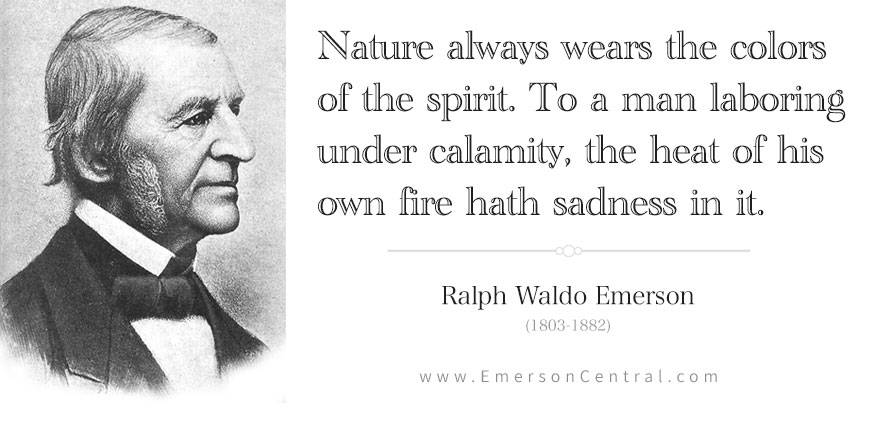
Chapter I from Nature , published as part of Nature; Addresses and Lectures
What Is The Meaning Behind Nature, The Poem?
Emerson often referred to nature as the "Universal Being" in his many lectures. It was Emerson who deeply believed there was a spiritual sense of the natural world which felt was all around him.
Going deeper still in this discussion of the "Universal Being", Emerson writes, "The aspect of nature is devout. Like the figure of Jesus, she stands with bended head, and hands folded upon the breast. The happiest man is he who learns from nature the lesson of worship."
It's common sense that "nature" is everything you see that is NOT man-made, or changed by man (trees, foliage, mountains, etc.), but Emerson reminds us that nature was set forth to serve man. This is the essence of human will, for man to harness nature. Every object in nature has its own beauty. Therefore, Emerson advocates to view nature as a reality by building your own world and surrounding yourself with natural beauty.
- The purpose of science is to find the theory of nature.
- Nature wears the colors of the Spirit.
- A man is fed, not to fill his belly, but so he may work.
- Each natural action is graceful.
"Material objects are necessarily kinds of scoriae of the substantial thoughts of the Creator, which must always preserve an exact relation to their first origin; in other words, visible nature must have a spiritual and moral side."
This quote is cited in numerous works and it is attributed to a "French philosopher." However, no name can be found in association with this quote.
What is the main point of Nature, by Emerson?
The central theme of Emerson's famous essay "Nature" is the harmony that exists between the natural world and human beings. In "Nature," Ralph Waldo Emerson contends that man should rid himself of material cares and instead of being burdened by unneeded stress, he can enjoy an original relation with the universe and experience what Emerson calls "the sublime."
What is the central idea of the essay Nature, by Emerson?
For Emerson, nature is not literally God but the body of God’s soul. ”Nature,” he writes, is “mind precipitated.” Emerson feels that to realize one’s role in this respect fully is to be in paradise (similar to heaven itself).
What is Emerson's view of the Nature of humans?
Content is coming very soon

Ralph Waldo Emerson left the ministry to pursue a career in writing and public speaking. Emerson became one of America's best known and best-loved 19th-century figures. More About Emerson
Quick Links
Self-reliance.
- Address at Divinity College
- English Traits
- Representative Men
- The American Scholar
- The Conduct of Life
- Essays: First Series
- Essays: Second Series
- Nature: Addresses/Lectures
- Lectures / Biographies
- Letters and Social Aims
Early Emerson Poems
- Uncollected Prose
- Government of Children
Emerson Quotes
"Every man has his own courage, and is betrayed because he seeks in himself the courage of other persons." – Ralph Waldo Emerson
“Do not go where the path may lead, go instead where there is no path and leave a trail.” – Ralph Waldo Emerson
“The purpose of life is not to be happy. It is to be useful, to be honorable, to be compassionate, to have it make some difference that you have lived and lived well.” – Ralph Waldo Emerson
Emerson's Essays
Research the collective works of Ralph Waldo Emerson. Read More Essay
Emerson's most famous work that can truly change your life. Check it out
America's best known and best-loved poems. More Poems
Nature Essay for Students and Children
500+ words nature essay.
Nature is an important and integral part of mankind. It is one of the greatest blessings for human life; however, nowadays humans fail to recognize it as one. Nature has been an inspiration for numerous poets, writers, artists and more of yesteryears. This remarkable creation inspired them to write poems and stories in the glory of it. They truly valued nature which reflects in their works even today. Essentially, nature is everything we are surrounded by like the water we drink, the air we breathe, the sun we soak in, the birds we hear chirping, the moon we gaze at and more. Above all, it is rich and vibrant and consists of both living and non-living things. Therefore, people of the modern age should also learn something from people of yesteryear and start valuing nature before it gets too late.

Significance of Nature
Nature has been in existence long before humans and ever since it has taken care of mankind and nourished it forever. In other words, it offers us a protective layer which guards us against all kinds of damages and harms. Survival of mankind without nature is impossible and humans need to understand that.
If nature has the ability to protect us, it is also powerful enough to destroy the entire mankind. Every form of nature, for instance, the plants , animals , rivers, mountains, moon, and more holds equal significance for us. Absence of one element is enough to cause a catastrophe in the functioning of human life.
We fulfill our healthy lifestyle by eating and drinking healthy, which nature gives us. Similarly, it provides us with water and food that enables us to do so. Rainfall and sunshine, the two most important elements to survive are derived from nature itself.
Further, the air we breathe and the wood we use for various purposes are a gift of nature only. But, with technological advancements, people are not paying attention to nature. The need to conserve and balance the natural assets is rising day by day which requires immediate attention.
Get the huge list of more than 500 Essay Topics and Ideas
Conservation of Nature
In order to conserve nature, we must take drastic steps right away to prevent any further damage. The most important step is to prevent deforestation at all levels. Cutting down of trees has serious consequences in different spheres. It can cause soil erosion easily and also bring a decline in rainfall on a major level.

Polluting ocean water must be strictly prohibited by all industries straightaway as it causes a lot of water shortage. The excessive use of automobiles, AC’s and ovens emit a lot of Chlorofluorocarbons’ which depletes the ozone layer. This, in turn, causes global warming which causes thermal expansion and melting of glaciers.
Therefore, we should avoid personal use of the vehicle when we can, switch to public transport and carpooling. We must invest in solar energy giving a chance for the natural resources to replenish.
In conclusion, nature has a powerful transformative power which is responsible for the functioning of life on earth. It is essential for mankind to flourish so it is our duty to conserve it for our future generations. We must stop the selfish activities and try our best to preserve the natural resources so life can forever be nourished on earth.
{ “@context”: “https://schema.org”, “@type”: “FAQPage”, “mainEntity”: [ { “@type”: “Question”, “name”: “Why is nature important?”, “acceptedAnswer”: { “@type”: “Answer”, “text”: “Nature is an essential part of our lives. It is important as it helps in the functioning of human life and gives us natural resources to lead a healthy life.” } }, { “@type”: “Question”, “name”: “How can we conserve nature?”, “acceptedAnswer”: { “@type”: “Answer”, “text”: “We can take different steps to conserve nature like stopping the cutting down of trees. We must not use automobiles excessively and take public transport instead. Further, we must not pollute our ocean and river water.” } } ] }
Customize your course in 30 seconds
Which class are you in.

- Travelling Essay
- Picnic Essay
- Our Country Essay
- My Parents Essay
- Essay on Favourite Personality
- Essay on Memorable Day of My Life
- Essay on Knowledge is Power
- Essay on Gurpurab
- Essay on My Favourite Season
- Essay on Types of Sports
Leave a Reply Cancel reply
Your email address will not be published. Required fields are marked *
Download the App


Home » News » Essay: The Healing Power of Nature
Essay: The Healing Power of Nature
October 15, 2019 October 30, 2019
While waiting for a hike to begin during Earth Week last spring at Kehl Lake, I felt my phone buzzing in my pocket. Glancing at the screen, I saw it was a close friend of mine, a college roommate, who dislikes talking on the phone, and almost never calls. I picked up.
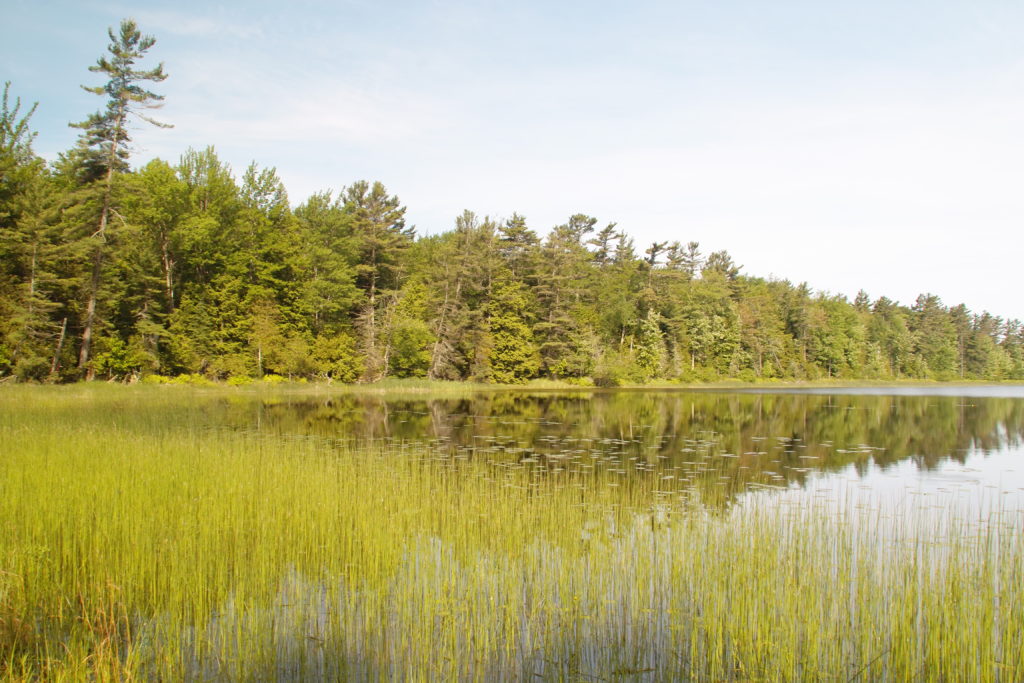
My friend could hardly speak but managed to get the words out that her daughter, 28, had died that morning of a drug overdose. She had just heard the news. It was a call that I had somehow always expected I might get, and yet it nearly took me to my knees.
Her daughter had struggled with addiction mightily for 12 years. She was bright, beautiful, married and a mother to an adorable three-year-old. This was a girl who my own two sons thought of as a cousin. She loved Leelanau and came up every summer with her mom and younger brother, to stay with us for a week. I can still see her jumping off our raft, or surfing the waves at Van’s Beach, or toasting marshmallows by firelight, her long dark hair pulled back.
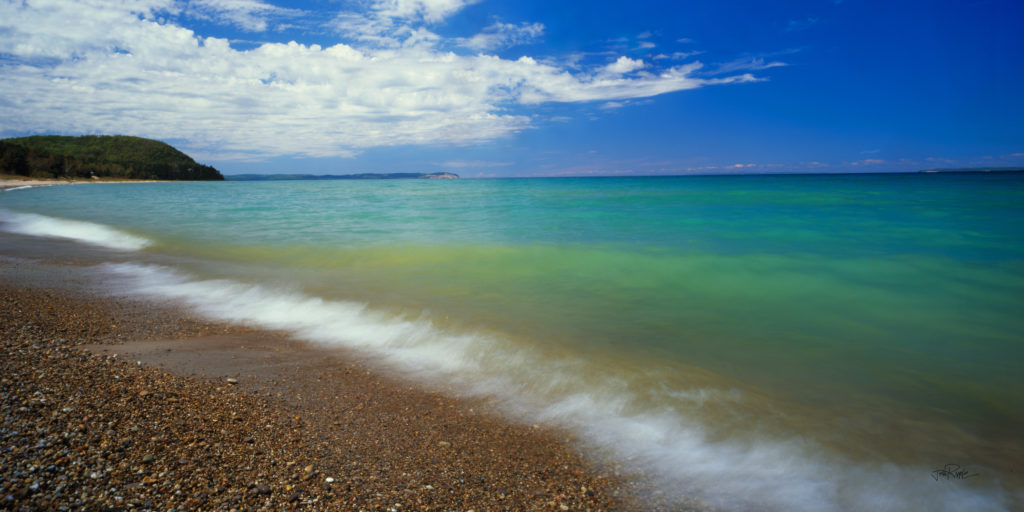
But tragically, as in so many cases across our nation, her drug addiction trumped everything. We went downstate to be with my friend and to attend the funeral. In the days that followed, I felt alternately numb and perpetually on the verge of tears, sad for my friend and incredulous at her unimaginable loss.
I came back to work later that week and our staff carpooled out to tour the new Cedar River Preserve addition. Our Board had just taken the leap of faith to buy this incredible 80 acres that could have easily become a ridgetop development, with its sweeping views of Lake Leelanau.
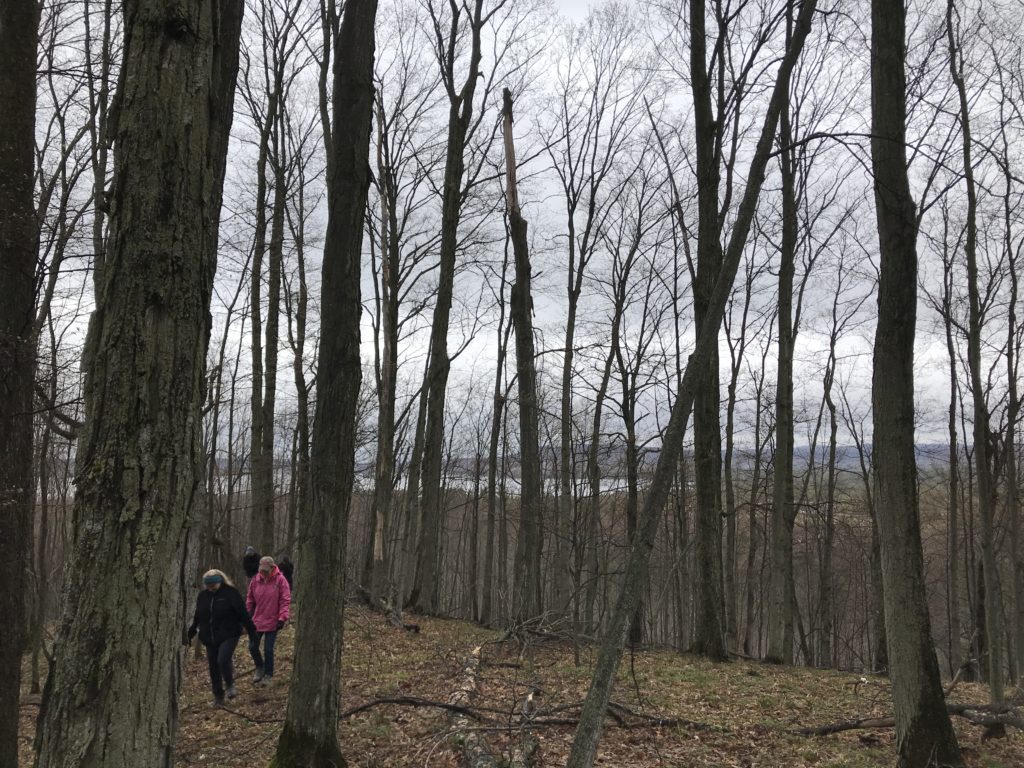
It was a cool and overcast May afternoon as we trekked up and along the ridgeline. The trees were still stark and bare. But the bright green of spring ephemerals on the hillside took my breath away, contrasting beautifully against the darkness of a forest floor rich with leaf litter. Iridescent moss and patterned lichen fanned out on decaying logs. We heard a cacophony of birdsong and looked down on a kettle hole lake, formed by the glaciers.
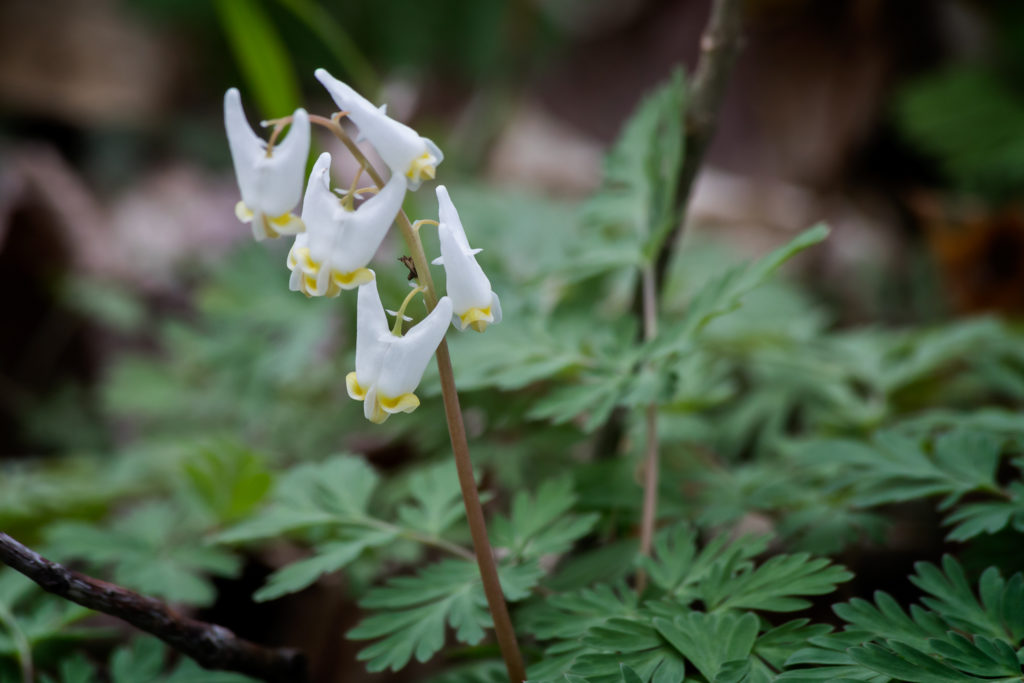
For the first time in weeks, I felt something ease in me. Seeing all of the new life after such a long, brutal winter felt hopeful. The ancientness of the kettle hole, the girth of old-growth trees, even the skeleton of what appeared to be a deer gave me a kind of peace and perspective that only nature can provide. Life and death are intertwined so beautifully and naturally in the out of doors. It gave me comfort to be reminded that each of us is just a small speck in time, whirling through a very big universe. Somehow, it felt easier to accept the death of my friend’s daughter.
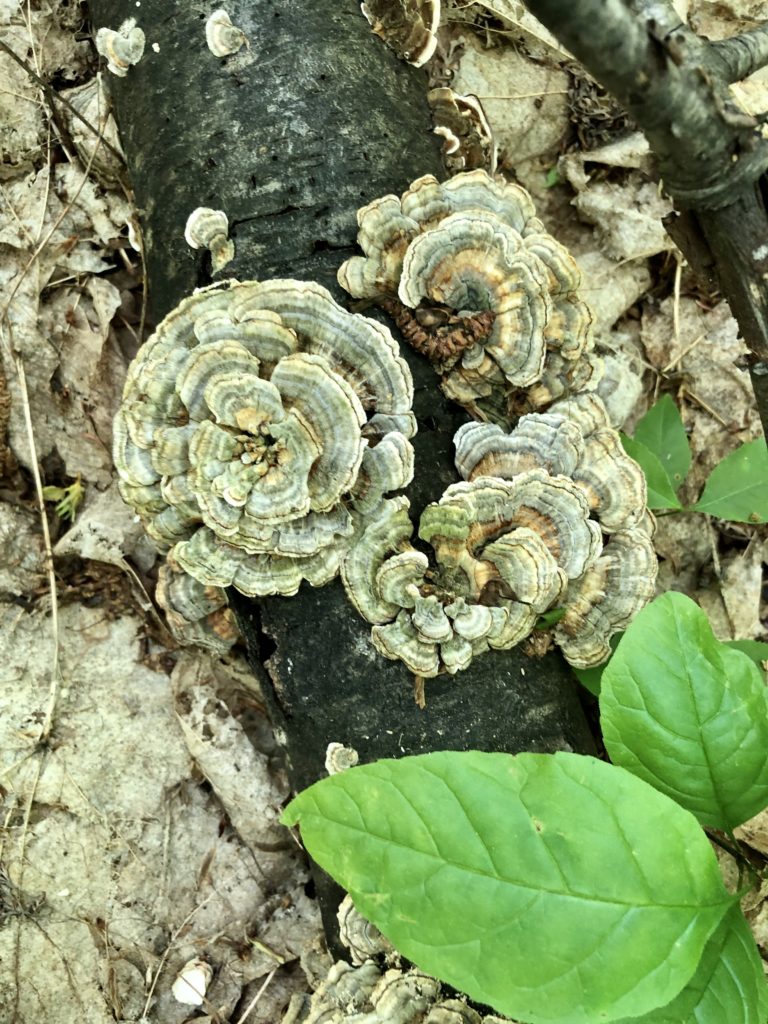
I couldn’t be more grateful that the Leelanau Conservancy has protected places like the Cedar River Preserve to hike in, to heal in, and to offer peace and perspective. My friend plans to come up this fall. We won’t visit the new preserve as it is not yet open to the public. But we will go to Clay Cliffs, to the dunes, and to Lake Michigan, remembering the little girl who once played along those shores.—– Carolyn Faught, Senior Writer and Donor Loyalty Specialist for the Leelanau Conservanc y
email Carolyn: [email protected]
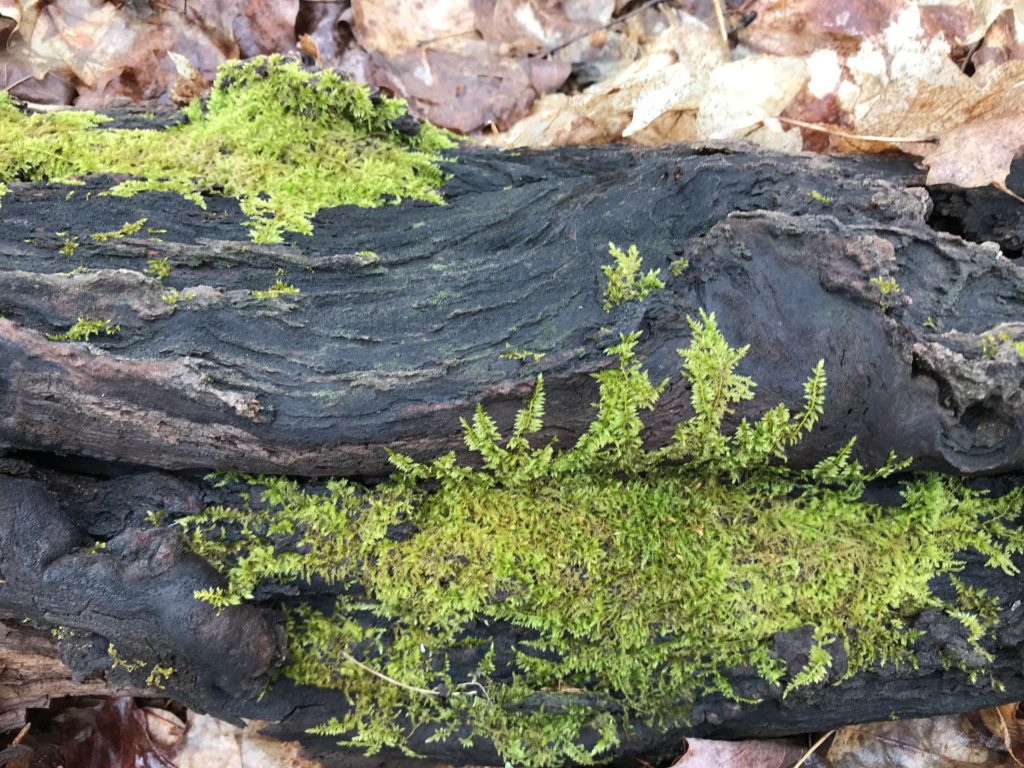
Cedar River Preserve, What’s Next?
Please Note: The new Cedar River Preserve 80-acre addition is not yet open to the public. As has been our practice with all natural areas, access is provided as soon as we can develop a management plan for the property that best preserves the land’s ecological resources and create safe, well-marked trails. Stay tuned for more information as plans unfold.
Become a steward of the land.
Help us preserve the wonders of Leelanau County by becoming a trail steward, volunteering at a workbee, or donating funds.
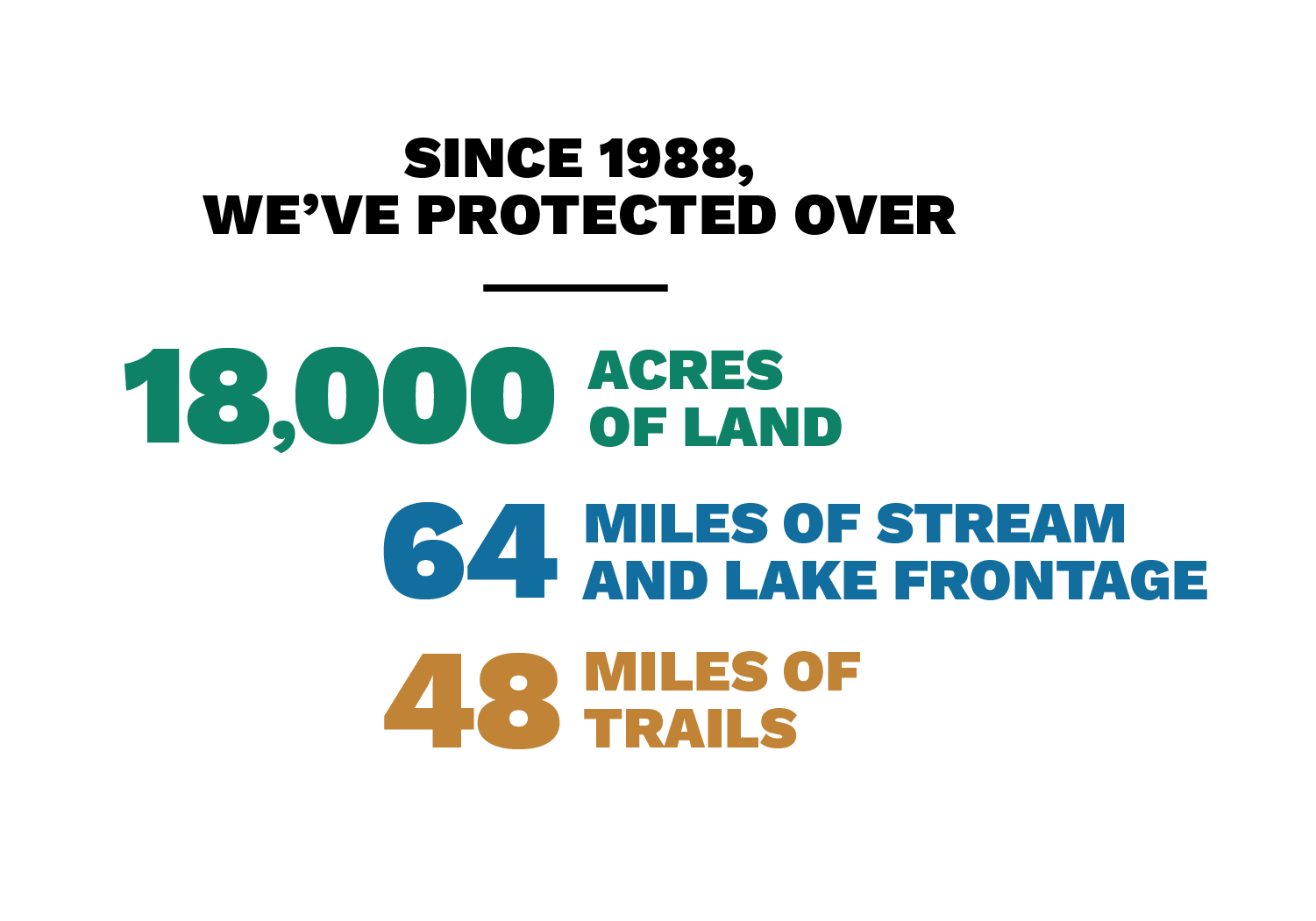
The Healing Power of Nature

I t sounded more like a lark than a scientific study when a handful of Japanese researchers set out to discover whether something special–and clinically therapeutic–happens when people spend time in nature. They were inspired by a new recommendation from the Forest Agency of Japan, which in the early 1980s began advising people to take strolls in the woods for better health. The practice was called forest bathing, or shinrin-yoku, and it was believed to lower stress–but that hadn’t been proved. Since then, a large body of evidence has shown that spending time in nature is responsible for many measurable beneficial changes in the body.
In one early study, Yoshifumi Miyazaki, a forest-therapy expert and researcher at Chiba University in Japan, found that people who spent 40 minutes walking in a cedar forest had lower levels of the stress hormone cortisol, which is involved in blood pressure and immune-system function, compared with when they spent 40 minutes walking in a lab. “I was surprised,” Miyazaki recalls. “Spending time in the forest induces a state of physiologic relaxation.”
Another researcher, Dr. Qing Li, a professor at the Nippon Medical School in Tokyo, found that trees and plants emit aromatic compounds called phytoncides that, when inhaled, can spur healthy biological changes in a manner similar to aromatherapy, which has also been studied for its therapeutic benefits. In his studies, Li has shown that when people walk through or stay overnight in forests, they often exhibit changes in the blood that are associated with protection against cancer, better immunity and lower blood pressure.
Recent studies have also linked nature to symptom relief for health issues like heart disease, depression, cancer, anxiety and attention disorders.
“The quiet atmosphere, beautiful scenery, good smells and fresh, clean air in forests all contribute to the effects,” says Li.
1 IT CAN LOWER BLOOD PRESSURE
Spending time outside is good for the heart, research shows, and since high blood pressure costs the U.S. approximately $48.6 billion per year and affects 1 in 3 Americans, visiting green spaces may be a simple and affordable way to improve heart health. A large June 2016 study found that nearly 10% of people with high blood pressure could get their hypertension under control if they spent just 30 minutes or more in a park each week. “If everyone were to make time for nature, the savings on health care costs could be incredible,” says study author Danielle Shanahan, a research fellow at the University of Queensland in Australia.
The fresh air could be one factor, since air pollution has been linked to a higher risk for heart attacks, but since the study participants lived in cities (and therefore were also being exposed to air pollution), that likely isn’t the only driver. Scientists think stress reduction also plays a part. “Nature is undemanding,” says Shanahan. “It requires effortless attention to look at the leaves of a tree, unlike the constant emails at work or the chores at home.”
Trees’ natural fragrance may also play a role, as some studies have shown that phytoncides lower blood pressure by quelling the body’s fight-or-flight response, which stresses the body.
2 EXPOSURE TO IT CAN INCREASE AWE
Looking at a stunning waterfall or undulating countryside can do more than enrich your Instagram feed: it can also elicit feelings of awe that bring a number of health benefits. In a 2015 study, researcher Paul Piff of the University of California, Irvine, found that people who spent 60 seconds looking up at towering trees were more likely to report feeling awe, after which they were more likely to help a stranger than people who looked at an equally tall–but far less awe-inspiring–building.
“Experiences of awe attune people to things larger than themselves,” says Piff. “They cause individuals to feel less entitled, less selfish, and to behave in more generous and helping ways.” The benefits of awe are physical too: regularly experiencing moments of awe has been linked to lower levels of inflammatory compounds in the body.
Everyday interactions with nature can also benefit. An April 2016 study of 44 cities found that urban areas with more parks scored higher on measures of community well-being. That’s likely because parks give people opportunities to socialize and be active with their neighbors, which could improve health, the researchers say. People in cities with lots of green space were more likely to report having more energy, good health and a sense of purpose too.
3 IT PROMOTES CANCER-FIGHTING CELLS
An April 2016 study published in the journal Environmental Health Perspectives reported that women living in areas with a lot of vegetation had a 12% lower risk of death from all causes compared with people in the least green places. That could be thanks to cleaner air, but nature may also offer its own medicine. Li’s research at Nippon Medical School shows that when people walk through a forest, they inhale phytoncides that increase their number of natural killer (NK) cells–a type of white blood cell that supports the immune system and is associated with a lower risk of cancer. NK cells are also thought to have a role in combating infections and autoimmune disorders and tamping down inflammation, which contributes to a wide range of ailments, including heart disease and diabetes.
In a 2010 study, researchers found that people who took two long walks through forests on consecutive days increased their NK cells by 50% and the activity of these cells by 56%. Those activity levels remained 23% higher than usual for the month following the walks. In another study, Li and his co-authors found that infusing people’s hotel rooms with phytoncides had some of the same anti-cancer-cell effects as those seen among people walking through forests.
4 IT CAN HELP WITH DEPRESSION AND ANXIETY
Not surprisingly, urban dwellers are far more likely to have anxiety and mood disorders than people who live in rural areas. That’s the bad news, since about 80% of Americans live in cities. The good news is that a small 2015 study published in the Proceedings of the National Academy of Sciences found that people who walked for 90 minutes in a natural setting, such as a forest or a nature park, were less likely to ruminate–a hallmark of depression and anxiety–and had lower activity in an area of the brain linked to depression than people who walked in an urban area. “Accessible natural areas may be vital for mental health in our rapidly urbanizing world,” the study authors write.
The exact mechanism of how nature helps mood disorders is unclear, but researchers agree that at the very least, time in nature tends to lift spirits. “When you have a short blast of nature exposure, people’s moods go up,” says Ming Kuo, an environment and behavior scientist at the University of Illinois at Urbana-Champaign. Another possibility is that the air near moving water, forests and mountains contains high levels of negative ions, which are thought to potentially reduce depression symptoms, according to a study in Frontiers in Psychology.
5 IT MAY HELP WITH ADHD SYMPTOMS
Small studies in kids with attention-deficit/hyperactivity disorder (ADHD) have suggested that nature walks could be a potential natural treatment to improve attention. In one study, a team led by Kuo of the University of Illinois at Urbana-Champaign had kids with ADHD take three 20-minute walks, without their medication, in different locations: a park, a neighborhood and an urban area. When the researchers tested the children afterward, they found that after a park walk, the kids were able to concentrate substantially better than after a walk in the other settings. In a separate 2011 study, Kuo and her colleagues found that children who regularly played in outdoor areas had milder ADHD symptoms, according to their parents, than children who played indoors or in areas with less nature access. “Nature gives the part of the brain that’s used in effortful concentration a rest,” says Kuo. “If you spend time doing something mentally relaxing, you feel rejuvenated.”
People without ADHD symptoms can also improve their attention and concentration by interacting with nature, evidence suggests. One University of Michigan study found that people improved their short-term memory by 20% after a nature walk but had no changes after walking through city streets.
6 EVEN FAKE NATURE HAS BENEFITS
Before you start planning your escape to the countryside, consider this: “There is plenty of evidence that you will get a range of benefits even if all you can manage is putting a plant in your room or looking at trees through your window at home,” says the University of Queensland’s Shanahan.
Research shows that even if they’re artificial, the images, sounds and smells of nature can have positive health effects. Listening to nature sounds over headphones, for instance, has been shown to help people recover faster from stress–which might explain why so many spas employ nature sounds in their treatment rooms.
Several studies have also shown that having a window view can improve attention, reduce stress and even help people in hospitals heal after operations. One widely cited study of people recovering from abdominal surgery found that those with tree-lined views were released faster from the hospital, experienced fewer complications and required less pain medication than people whose rooms faced a brick wall.
More Must-Reads From TIME
- The 100 Most Influential People of 2024
- How Far Trump Would Go
- Scenes From Pro-Palestinian Encampments Across U.S. Universities
- Saving Seconds Is Better Than Hours
- Why Your Breakfast Should Start with a Vegetable
- 6 Compliments That Land Every Time
- Welcome to the Golden Age of Ryan Gosling
- Want Weekly Recs on What to Watch, Read, and More? Sign Up for Worth Your Time
Contact us at [email protected]
Greater Good Science Center • Magazine • In Action • In Education
Mind & Body Articles & More
How nature can make you kinder, happier, and more creative, we are spending more time indoors and online. but recent studies suggest that nature can help our brains and bodies to stay healthy..
I’ve been an avid hiker my whole life. From the time I first strapped on a backpack and headed into the Sierra Nevada Mountains, I was hooked on the experience, loving the way being in nature cleared my mind and helped me to feel more grounded and peaceful.
But, even though I’ve always believed that hiking in nature had many psychological benefits, I’ve never had much science to back me up…until now, that is. Scientists are beginning to find evidence that being in nature has a profound impact on our brains and our behavior, helping us to reduce anxiety, brooding, and stress, and increase our attention capacity, creativity, and our ability to connect with other people.
“People have been discussing their profound experiences in nature for the last several 100 years—from Thoreau to John Muir to many other writers,” says researcher David Strayer, of the University of Utah. “Now we are seeing changes in the brain and changes in the body that suggest we are physically and mentally more healthy when we are interacting with nature.”

While he and other scientists may believe nature benefits our well-being, we live in a society where people spend more and more time indoors and online—especially children. Findings on how nature improves our brains brings added legitimacy to the call for preserving natural spaces—both urban and wild—and for spending more time in nature in order to lead healthier, happier, and more creative lives.
Here are some of the ways that science is showing how being in nature affects our brains and bodies.
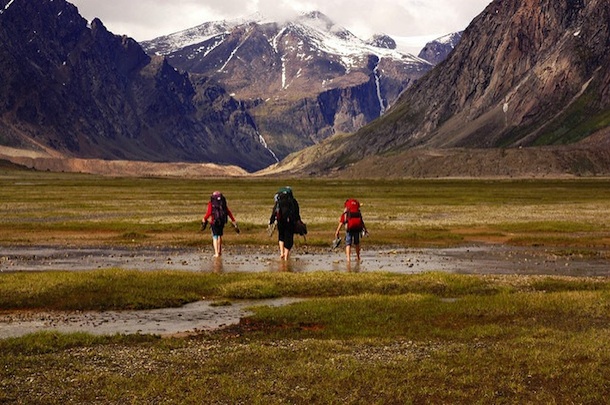
1. Being in nature decreases stress
It’s clear that hiking—and any physical activity—can reduce stress and anxiety. But, there’s something about being in nature that may augment those impacts.
In one recent experiment conducted in Japan, participants were assigned to walk either in a forest or in an urban center (taking walks of equal length and difficulty) while having their heart rate variability, heart rate, and blood pressure measured. The participants also filled out questionnaires about their moods, stress levels, and other psychological measures.
Results showed that those who walked in forests had significantly lower heart rates and higher heart rate variability (indicating more relaxation and less stress), and reported better moods and less anxiety, than those who walked in urban settings. The researchers concluded that there’s something about being in nature that had a beneficial effect on stress reduction, above and beyond what exercise alone might have produced.
In another study , researchers in Finland found that urban dwellers who strolled for as little as 20 minutes through an urban park or woodland reported significantly more stress relief than those who strolled in a city center.
The reasons for this effect are unclear; but scientists believe that we evolved to be more relaxed in natural spaces. In a now-classic laboratory experiment by Roger Ulrich of Texas A&M University and colleagues, participants who first viewed a stress-inducing movie, and were then exposed to color/sound videotapes depicting natural scenes, showed much quicker, more complete recovery from stress than those who’d been exposed to videos of urban settings.
These studies and others provide evidence that being in natural spaces— or even just looking out of a window onto a natural scene—somehow soothes us and relieves stress.
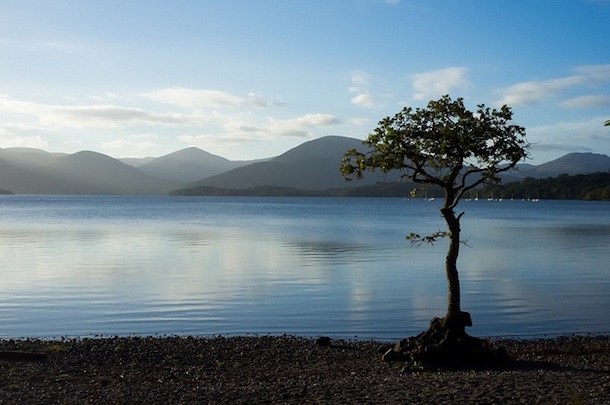
2. Nature makes you happier and less brooding
I’ve always found that hiking in nature makes me feel happier, and of course decreased stress may be a big part of the reason why. But, Gregory Bratman, of Stanford University, has found evidence that nature may impact our mood in other ways, too.
In one 2015 study , he and his colleagues randomly assigned 60 participants to a 50-minute walk in either a natural setting (oak woodlands) or an urban setting (along a four-lane road). Before and after the walk, the participants were assessed on their emotional state and on cognitive measures, such as how well they could perform tasks requiring short-term memory. Results showed that those who walked in nature experienced less anxiety, rumination (focused attention on negative aspects of oneself), and negative affect, as well as more positive emotions, in comparison to the urban walkers. They also improved their performance on the memory tasks.
In another study, he and his colleagues extended these findings by zeroing in on how walking in nature affects rumination—which has been associated with the onset of depression and anxiety—while also using fMRI technology to look at brain activity. Participants who took a 90-minute walk in either a natural setting or an urban setting had their brains scanned before and after their walks and were surveyed on self-reported rumination levels (as well as other psychological markers). The researchers controlled for many potential factors that might influence rumination or brain activity—for example, physical exertion levels as measured by heart rates and pulmonary functions.
Even so, participants who walked in a natural setting versus an urban setting reported decreased rumination after the walk, and they showed increased activity in the subgenual prefrontal cortex, an area of the brain whose deactivation is affiliated with depression and anxiety—a finding that suggests nature may have important impacts on mood.
Bratman believes results like these need to reach city planners and others whose policies impact our natural spaces. “Ecosystem services are being incorporated into decision making at all levels of public policy, land use planning, and urban design, and it’s very important to be sure to incorporate empirical findings from psychology into these decisions,” he says.
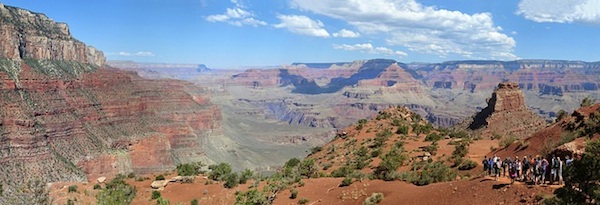
3. Nature relieves attention fatigue and increases creativity.
Today, we live with ubiquitous technology designed to constantly pull for our attention. But many scientists believe our brains were not made for this kind of information bombardment, and that it can lead to mental fatigue, overwhelm, and burnout, requiring “attention restoration” to get back to a normal, healthy state.
Strayer is one of those researchers. He believes that being in nature restores depleted attention circuits, which can then help us be more open to creativity and problem-solving.
“When you use your cell phone to talk, text, shoot photos, or whatever else you can do with your cell phone, you’re tapping the prefrontal cortex and causing reductions in cognitive resources,” he says.
More on the Power of Nature
Do we need God to feel awe?
How awe can make kids less self-absorbed .
How awe creates a greater sense of time and happiness .
How awe makes us more generous .
How feeling awe can make you healthier .
In a 2012 study , he and his colleagues showed that hikers on a four-day backpacking trip could solve significantly more puzzles requiring creativity when compared to a control group of people waiting to take the same hike—in fact, 47 percent more. Although other factors may account for his results—for example, the exercise or the camaraderie of being out together—prior studies have suggested that nature itself may play an important role. One in Psychological Science found that the impact of nature on attention restoration is what accounted for improved scores on cognitive tests for the study participants.
This phenomenon may be due to differences in brain activation when viewing natural scenes versus more built-up scenes—even for those who normally live in an urban environment. In a recent study conducted by Peter Aspinall at Heriot-Watt University, Edinburgh, and colleagues, participants who had their brains monitored continuously using mobile electroencephalogram (EEG) while they walked through an urban green space had brain EEG readings indicating lower frustration, engagement, and arousal, and higher meditation levels while in the green area, and higher engagement levels when moving out of the green area. This lower engagement and arousal may be what allows for attention restoration, encouraging a more open, meditative mindset.
It’s this kind of brain activity—sometimes referred to as “the brain default network”—that is tied to creative thinking , says Strayer. He is currently repeating his earlier 2012 study with a new group of hikers and recording their EEG activity and salivary cortisol levels before, during, and after a three-day hike. Early analyses of EEG readings support the theory that hiking in nature seems to rest people’s attention networks and to engage their default networks.
Strayer and colleagues are also specifically looking at the effects of technology by monitoring people’s EEG readings while they walk in an arboretum, either while talking on their cell phone or not. So far, they’ve found that participants with cell phones appear to have EEG readings consistent with attention overload, and can recall only half as many details of the arboretum they just passed through, compared to those who were not on a cell phone.
Though Strayer’s findings are preliminary, they are consistent with other people’s findings on the importance of nature to attention restoration and creativity.
“If you’ve been using your brain to multitask—as most of us do most of the day—and then you set that aside and go on a walk, without all of the gadgets, you’ve let the prefrontal cortex recover,” says Strayer. “And that’s when we see these bursts in creativity, problem-solving, and feelings of well-being.”
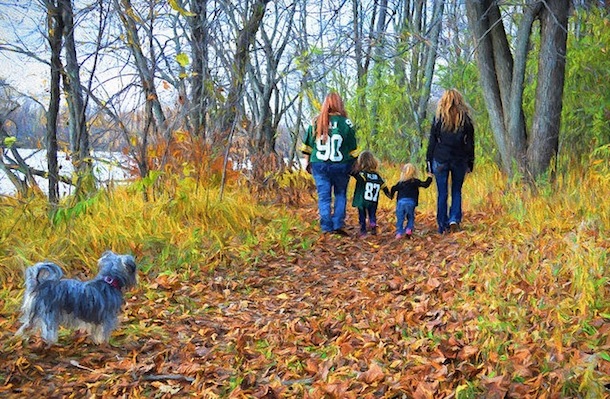
4. Nature may help you to be kind and generous
Whenever I go to places like Yosemite or the Big Sur Coast of California, I seem to return to my home life ready to be more kind and generous to those around me—just ask my husband and kids! Now some new studies may shed light on why that is.
In a series of experiments published in 2014, Juyoung Lee, GGSC director Dacher Keltner, and other researchers at the University of California, Berkeley, studied the potential impact of nature on the willingness to be generous, trusting, and helpful toward others, while considering what factors might influence that relationship.
As part of their study, the researchers exposed participants to more or less subjectively beautiful nature scenes (whose beauty levels were rated independently) and then observed how participants behaved playing two economics games—the Dictator Game and the Trust Game—that measure generosity and trust, respectively. After being exposed to the more beautiful nature scenes, participants acted more generously and more trusting in the games than those who saw less beautiful scenes, and the effects appeared to be due to corresponding increases in positive emotion.
In another part of the study, the researchers asked people to fill out a survey about their emotions while sitting at a table where more or less beautiful plants were placed. Afterwards, the participants were told that the experiment was over and they could leave, but that if they wanted to they could volunteer to make paper cranes for a relief effort program in Japan. The number of cranes they made (or didn’t make) was used as a measure of their “prosociality” or willingness to help.
Results showed that the presence of more beautiful plants significantly increased the number of cranes made by participants, and that this increase was, again, mediated by positive emotion elicited by natural beauty. The researchers concluded that experiencing the beauty of nature increases positive emotion—perhaps by inspiring awe, a feeling akin to wonder, with the sense of being part of something bigger than oneself—which then leads to prosocial behaviors.
Support for this theory comes from an experiment conducted by Paul Piff of the University of California, Irvine, and colleagues, in which participants staring up a grove of very tall trees for as little as one minute experienced measurable increases in awe, and demonstrated more helpful behavior and approached moral dilemmas more ethically, than participants who spent the same amount of time looking up at a high building.
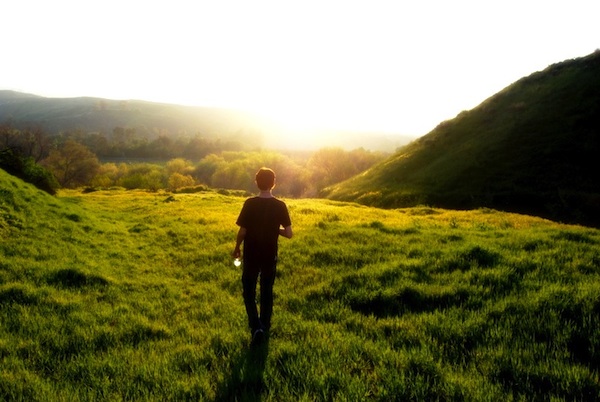
5. Nature makes you “feel more alive”
With all of these benefits to being out in nature, it’s probably no surprise that something about nature makes us feel more alive and vital . Being outdoors gives us energy, makes us happier, helps us to relieve the everyday stresses of our overscheduled lives, opens the door to creativity, and helps us to be kind to others.
No one knows if there is an ideal amount of nature exposure, though Strayer says that longtime backpackers suggest a minimum of three days to really unplug from our everyday lives. Nor can anyone say for sure how nature compares to other forms of stress relief or attention restoration, such as sleep or meditation. Both Strayer and Bratman say we need a lot more careful research to tease out these effects before we come to any definitive conclusions.
Still, the research does suggest there’s something about nature that keeps us psychologically healthy, and that’s good to know…especially since nature is a resource that’s free and that many of us can access by just walking outside our door. Results like these should encourage us as a society to consider more carefully how we preserve our wilderness spaces and our urban parks.
And while the research may not be conclusive, Strayer is optimistic that science will eventually catch up to what people like me have intuited all along—that there’s something about nature that renews us, allowing us to feel better, to think better, and to deepen our understanding of ourselves and others.
“You can’t have centuries of people writing about this and not have something going on,” says Strayer. “If you are constantly on a device or in front of a screen, you’re missing out on something that’s pretty spectacular: the real world.”
About the Author

Jill Suttie
Jill Suttie, Psy.D. , is Greater Good ’s former book review editor and now serves as a staff writer and contributing editor for the magazine. She received her doctorate of psychology from the University of San Francisco in 1998 and was a psychologist in private practice before coming to Greater Good .
You May Also Enjoy
This article — and everything on this site — is funded by readers like you.
Become a subscribing member today. Help us continue to bring “the science of a meaningful life” to you and to millions around the globe.

Ralph Waldo Emerson
Ask litcharts ai: the answer to your questions.
In “Nature,” Emerson stresses that while humankind used to enjoy a close, pure, harmonious connection to nature, this is no longer the case. Individuals and society as a whole have become corrupted, largely because people have become disconnected from their own intuition, spirituality, and sense of morality. But Emerson suggests that nature can heal humanity on both small and large scales. This starts on an individual level: if people spend more time in nature, it will revitalize and enlighten them, and this positive transformation will ripple out to the rest of society.
Writing in the mid-1830s in the U.S., Emerson suggests that corruption abounds on both the societal and individual level. Throughout the essay, Emerson underscores that nature teaches people moral and spiritual truths, if only people use their intuition (what Emerson calls “Reason”) to recognize and absorb these lessons. But people have grown physically and emotionally distant from nature—moving out of the countryside and to the increasingly industrialized cities, for instance—and so they’ve consequently lost touch with this key source of moral and spiritual guidance. Emerson writes that the average person’s “mind is imbruted and he is a selfish savage.” Drawing on the ideas of Transcendentalist writer Amos Bronson Alcott (whom Emerson refers to in the essay as the “Orphic poet”), Emerson explains that humans have corrupting desires—like the desire for wealth, power, pleasure, or praise—and that giving in to those desires further disconnect people from nature. Living in a society that’s physically set apart from nature and ungrounded in the kind of moral and spiritual truth that nature provides destroys a person’s wholeness. And this separates them even further from other people, nature, morality, spirituality, and their own selves.
Given that humankind’s growing distance from nature is responsible for this widespread corruption, Emerson suggests that it’s only through interacting with nature directly that people can better themselves, becoming more energized, happier, and wiser. Unlike society, nature has a rejuvenating effect on people. Emerson suggests that people who spend time in nature “retain[] the spirit of infancy even into the era of manhood.” In other words, even as a person grows old, their spirit stays young; they still possess a childlike energy, curiosity, and reverence when they live in close proximity to nature. Emerson uses the metaphor of a snake sloughing off its dead skin—revealing fresh, tender skin beneath—to illustrate how a person casts off their old age and is renewed in nature. “In the woods,” Emerson writes, “is perpetual youth.” Nature is also a source of joy, wonder, and emotional bliss. Throughout the essay, Emerson draws on his own experiences in nature. Each time, he uses joyful, emotionally charged language to describe his emotions. While he’s in the countryside, he “enjoy[s] a perfect exhilaration,” and admits, “Almost I fear to think how glad I am.” Nature’s sheer beauty brings about emotional bliss and fulfillment, as it “satisfies the soul purely by its loveliness.” Another important aspect of nature is the deep sense of awe that it stirs up in a person. Emerson likens the dawn to the ancient Assyrian empire (known for its vastness, power, and splendor), the moonlight to “unimaginable realms of faerie,” and nighttime to “mystic philosophy and dreams.” Emerson links nature to magnificent, indescribable, awe-inspiring places and things to emphasize that nature shares those same qualities and incites a similar sense of wonder within him.
Being in nature is also a positive form of escapism from sadness and puts a person’s day-to-day struggles into perspective. He explains how if a person were to be alone in nature and look up at the stars, the starlight “will separate between him and vulgar things” (in Emerson’s time, “vulgar” meant common, day-to-day things). Likewise, he suggests that when a person ventures out into nature, “a wild delight runs through [them], in spite of real sorrows.” With this, Emerson suggests that while a person may have very real problems in their life, nature has a bolstering, invigorating effect and can help a person put their problems into perspective. Taking this a step further, Emerson suggests that nature can even heal or solve a person’s problems. Speaking from his own experience, he writes, “In the woods [...] I feel that nothing can befall me in life—no disgrace, no calamity [...] which nature cannot repair.” Nature also provides crucial moral guidance. To illustrate this point, Emerson gives the example of a fisherman who learns “firmness” (i.e., strength of character) while out at sea: though the ocean waves crash forcefully over the rocks again and again, the rocks remain unmoved.
In the essay’s final chapter, Emerson stresses that the only way to return the world to its former utopia (in which humankind and nature lived in harmony) is through “redemption of the soul.” In other words, people need to become whole again on an individual level before the wider world can be redeemed, and this kind of personal transformation only happens in nature.
The Transformative Power of Nature ThemeTracker

The Transformative Power of Nature Quotes in Nature
The sun shines to-day also. There is more wool and flax in the fields. There are new lands, new men, new thoughts. Let us demand our own works and laws and worship.
But if a man would be alone, let him look at the stars. The rays that come from those heavenly worlds, will separate between him and vulgar things. One might think the atmosphere was made transparent with this design, to give man, in the heavenly bodies, the perpetual presence of the sublime. Seen in the streets of cities, how great they are! If the stars should appear one night in a thousand years, how would men believe and adore; and preserve for many generations the remembrance of the city of God which had been shown! But every night come out these preachers of beauty, and light the universe with their admonishing smile.
The stars awaken a certain reverence, because though always present, they are inaccessible; but all natural objects make a kindred impression, when the mind is open to their influence.

In the woods, we return to reason and faith. There I feel that nothing can befall me in life—no disgrace, no calamity, (leaving me my eyes,) which nature cannot repair. Standing on the bare ground—my head bathed by the blithe air, and uplifted into infinite space—all mean egotism vanishes. I become a transparent eye-ball; I am nothing. I see all. The currents of the Universal Being circulate through me; I am part or particle of God.
It is necessary to use these pleasures with great temperance. For, nature is not always tricked in holiday attire, but the same scene which yesterday breathed perfume and glittered as for the frolic of the nymphs, is overspread with melancholy today. Nature always wears the colors of the spirit. To a man laboring under calamity, the heat of his own fire hath sadness in it. Then, there is a kind of contempt of the landscape felt by him who has just lost by death a dear friend. The sky is less grand as it shuts down over less worth in the population.
The misery of man appears like childish petulance, when we explore the steady and prodigal provision that has been made for his support and delight on this green ball which floats him through the heavens. What angels invented these splendid ornaments, these rich conveniences, this ocean of air above, this ocean of water beneath, this firmament of earth between? this zodiac of lights, this tent of dropping clouds, this striped coat of climates, this fourfold year? Beasts, fire, water, stones, and corn serve him. The field is at once his floor, his work-yard, his play-ground, his garden, and his bed.
To the body and mind which have been cramped by noxious work or company, nature is medicinal and restores their tone. The tradesman, the attorney comes out of the din and craft of the street, and sees the sky and the woods, and is a man again. In their eternal calm, he finds himself. The health of the eye seems to demand a horizon. We are never tired, so long as we can see far enough.
Therefore, that spirit, that is, the Supreme Being, does not build up nature around us, but puts it forth through us, as the life of the tree puts forth new branches and leaves through the pores of the old. As a plant upon the earth, so a man rests upon the bosom of God: he is nourished by unfailing fountains, and draws, at his need, inexhaustible power.
The reason why the world lacks unity, and lies broken and in heaps, is, because man is disunited with himself. He cannot be a naturalist, until he satisfies all the demands of the spirit.

Power of Nature
Despite the efforts of humans to make a stamp on the earth, nature will always outlast everything:
- ‘Two vast and trunkless legs of stone Stand in the desert’
- ‘on the sand, Half sunk, a shattered visage lies’
- ‘Nothing beside remains.’
- ‘Round the decay of that colossal wreck’
- ‘The lone and level sands stretch far away’
Extract from the Prelude
During his journey in a boat, the young boy is forced to realise the awesome power of nature:
- ‘One summer evening’
- Small circles glittering idly in the moon’
- ‘summit of a craggy ridge, The horizon’s utmost boundary’
- ‘far above Was nothing but the stars and the grey sky’
- ‘the grim shape Towered up between me and the stars’
- ‘measured motion like a living thing, Strode after me.’
Soldiers faced extreme weather conditions, whilst they were deployed at war.
- Merciless iced east winds that knife us…’
- ‘Like twitching agonies of men among its brambles’
- ‘ait that shudders black with snow’
- ‘sidelong flowing flakes that flock, pause and renew’
- _‘wind’s nonchalance’ _
- ‘Pale flakes with lingering stealth come feeling for our faces-‘
- ‘His frost will fasten on this mud and us’
- ‘All their eyes are ice’
Storm on the Island
The storm reflects the power of nature and how manipulate the actions of humans:
- ‘leaves and branches Can raise a chorus in a gale’
- It blows full Blast’
- ‘But there are no trees, no natural shelter’
- ‘You might think that the sea is company’
- We are bombarded by the empty air’
Bayonet Charge
It is often forgotten that nature is also damaged, during times of conflict:
- ‘Stumbling across a field of clods towards a green hedge’
- Threw up a yellow hare that rolled like a flame’
- ‘mouth wide Open silent, its eyes standing out.’
Nature is used as a symbol to communicate deeper meanings and concepts:
- ‘poppies had already been placed’
- ‘white cat hairs’
- ‘released a song bird from its cage’
- ‘a single dove flew from the pear tree’
- ‘The dove pulled freely against the sky’
Nature is powerful, because it has always existed and will continue long after generations of people:
- ‘The sun shines through their borderlines’
- ‘the marks that rivers make’
- ‘roads, railtracks, mountainfolds’
- ‘a grand design //with living tissue’
- ‘turned into your skin’
Exposure to nature reduces negative emotions and tension. The pilot changes his direction, because nature reminds him of the benefits of living:
- ‘he must have looked far down at the little fishing boats’
- ‘green-blue translucent sea’
- ‘arcing in swathes like a huge flag… in the figure of eight’
- ‘dark shoals of fishes… swivelled towards the sun’
- ‘turbulent inrush of breakers’
- ‘cloud-marked mackerel, black crabs, feathery prawns… whitebait’
- ‘tuna, the dark prince, muscular, dangerous’
- CBSE Class 10th
- CBSE Class 12th
- UP Board 10th
- UP Board 12th
- Bihar Board 10th
- Bihar Board 12th
- Top Schools in India
- Top Schools in Delhi
- Top Schools in Mumbai
- Top Schools in Chennai
- Top Schools in Hyderabad
- Top Schools in Kolkata
- Top Schools in Pune
- Top Schools in Bangalore
Products & Resources
- JEE Main Knockout April
- Free Sample Papers
- Free Ebooks
- NCERT Notes
- NCERT Syllabus
- NCERT Books
- RD Sharma Solutions
- Navodaya Vidyalaya Admission 2024-25
- NCERT Solutions
- NCERT Solutions for Class 12
- NCERT Solutions for Class 11
- NCERT solutions for Class 10
- NCERT solutions for Class 9
- NCERT solutions for Class 8
- NCERT Solutions for Class 7
- JEE Main 2024
- MHT CET 2024
- JEE Advanced 2024
- BITSAT 2024
- View All Engineering Exams
- Colleges Accepting B.Tech Applications
- Top Engineering Colleges in India
- Engineering Colleges in India
- Engineering Colleges in Tamil Nadu
- Engineering Colleges Accepting JEE Main
- Top IITs in India
- Top NITs in India
- Top IIITs in India
- JEE Main College Predictor
- JEE Main Rank Predictor
- MHT CET College Predictor
- AP EAMCET College Predictor
- GATE College Predictor
- KCET College Predictor
- JEE Advanced College Predictor
- View All College Predictors
- JEE Main Question Paper
- JEE Main Cutoff
- JEE Main Answer Key
- SRMJEEE Result
- Download E-Books and Sample Papers
- Compare Colleges
- B.Tech College Applications
- JEE Advanced Registration
- MAH MBA CET Exam
- View All Management Exams
Colleges & Courses
- MBA College Admissions
- MBA Colleges in India
- Top IIMs Colleges in India
- Top Online MBA Colleges in India
- MBA Colleges Accepting XAT Score
- BBA Colleges in India
- XAT College Predictor 2024
- SNAP College Predictor
- NMAT College Predictor
- MAT College Predictor 2024
- CMAT College Predictor 2024
- CAT Percentile Predictor 2023
- CAT 2023 College Predictor
- CMAT 2024 Registration
- TS ICET 2024 Registration
- CMAT Exam Date 2024
- MAH MBA CET Cutoff 2024
- Download Helpful Ebooks
- List of Popular Branches
- QnA - Get answers to your doubts
- IIM Fees Structure
- AIIMS Nursing
- Top Medical Colleges in India
- Top Medical Colleges in India accepting NEET Score
- Medical Colleges accepting NEET
- List of Medical Colleges in India
- List of AIIMS Colleges In India
- Medical Colleges in Maharashtra
- Medical Colleges in India Accepting NEET PG
- NEET College Predictor
- NEET PG College Predictor
- NEET MDS College Predictor
- DNB CET College Predictor
- DNB PDCET College Predictor
- NEET Admit Card 2024
- NEET PG Application Form 2024
- NEET Cut off
- NEET Online Preparation
- Download Helpful E-books
- LSAT India 2024
- Colleges Accepting Admissions
- Top Law Colleges in India
- Law College Accepting CLAT Score
- List of Law Colleges in India
- Top Law Colleges in Delhi
- Top Law Collages in Indore
- Top Law Colleges in Chandigarh
- Top Law Collages in Lucknow
Predictors & E-Books
- CLAT College Predictor
- MHCET Law ( 5 Year L.L.B) College Predictor
- AILET College Predictor
- Sample Papers
- Compare Law Collages
- Careers360 Youtube Channel
- CLAT Syllabus 2025
- CLAT Previous Year Question Paper
- AIBE 18 Result 2023
- NID DAT Exam
- Pearl Academy Exam
Predictors & Articles
- NIFT College Predictor
- UCEED College Predictor
- NID DAT College Predictor
- NID DAT Syllabus 2025
- NID DAT 2025
- Design Colleges in India
- Fashion Design Colleges in India
- Top Interior Design Colleges in India
- Top Graphic Designing Colleges in India
- Fashion Design Colleges in Delhi
- Fashion Design Colleges in Mumbai
- Fashion Design Colleges in Bangalore
- Top Interior Design Colleges in Bangalore
- NIFT Result 2024
- NIFT Fees Structure
- NIFT Syllabus 2025
- Free Design E-books
- List of Branches
- Careers360 Youtube channel
- IPU CET BJMC
- JMI Mass Communication Entrance Exam
- IIMC Entrance Exam
- Media & Journalism colleges in Delhi
- Media & Journalism colleges in Bangalore
- Media & Journalism colleges in Mumbai
- List of Media & Journalism Colleges in India
- CA Intermediate
- CA Foundation
- CS Executive
- CS Professional
- Difference between CA and CS
- Difference between CA and CMA
- CA Full form
- CMA Full form
- CS Full form
- CA Salary In India
Top Courses & Careers
- Bachelor of Commerce (B.Com)
- Master of Commerce (M.Com)
- Company Secretary
- Cost Accountant
- Charted Accountant
- Credit Manager
- Financial Advisor
- Top Commerce Colleges in India
- Top Government Commerce Colleges in India
- Top Private Commerce Colleges in India
- Top M.Com Colleges in Mumbai
- Top B.Com Colleges in India
- IT Colleges in Tamil Nadu
- IT Colleges in Uttar Pradesh
- MCA Colleges in India
- BCA Colleges in India
Quick Links
- Information Technology Courses
- Programming Courses
- Web Development Courses
- Data Analytics Courses
- Big Data Analytics Courses
- RUHS Pharmacy Admission Test
- Top Pharmacy Colleges in India
- Pharmacy Colleges in Pune
- Pharmacy Colleges in Mumbai
- Colleges Accepting GPAT Score
- Pharmacy Colleges in Lucknow
- List of Pharmacy Colleges in Nagpur
- GPAT Result
- GPAT 2024 Admit Card
- GPAT Question Papers
- NCHMCT JEE 2024
- Mah BHMCT CET
- Top Hotel Management Colleges in Delhi
- Top Hotel Management Colleges in Hyderabad
- Top Hotel Management Colleges in Mumbai
- Top Hotel Management Colleges in Tamil Nadu
- Top Hotel Management Colleges in Maharashtra
- B.Sc Hotel Management
- Hotel Management
- Diploma in Hotel Management and Catering Technology
Diploma Colleges
- Top Diploma Colleges in Maharashtra
- UPSC IAS 2024
- SSC CGL 2024
- IBPS RRB 2024
- Previous Year Sample Papers
- Free Competition E-books
- Sarkari Result
- QnA- Get your doubts answered
- UPSC Previous Year Sample Papers
- CTET Previous Year Sample Papers
- SBI Clerk Previous Year Sample Papers
- NDA Previous Year Sample Papers
Upcoming Events
- NDA Application Form 2024
- UPSC IAS Application Form 2024
- CDS Application Form 2024
- CTET Admit card 2024
- HP TET Result 2023
- SSC GD Constable Admit Card 2024
- UPTET Notification 2024
- SBI Clerk Result 2024
Other Exams
- SSC CHSL 2024
- UP PCS 2024
- UGC NET 2024
- RRB NTPC 2024
- IBPS PO 2024
- IBPS Clerk 2024
- IBPS SO 2024
- Top University in USA
- Top University in Canada
- Top University in Ireland
- Top Universities in UK
- Top Universities in Australia
- Best MBA Colleges in Abroad
- Business Management Studies Colleges
Top Countries
- Study in USA
- Study in UK
- Study in Canada
- Study in Australia
- Study in Ireland
- Study in Germany
- Study in China
- Study in Europe
Student Visas
- Student Visa Canada
- Student Visa UK
- Student Visa USA
- Student Visa Australia
- Student Visa Germany
- Student Visa New Zealand
- Student Visa Ireland
- CUET PG 2024
- IGNOU B.Ed Admission 2024
- DU Admission 2024
- UP B.Ed JEE 2024
- LPU NEST 2024
- IIT JAM 2024
- IGNOU Online Admission 2024
- Universities in India
- Top Universities in India 2024
- Top Colleges in India
- Top Universities in Uttar Pradesh 2024
- Top Universities in Bihar
- Top Universities in Madhya Pradesh 2024
- Top Universities in Tamil Nadu 2024
- Central Universities in India
- CUET Exam City Intimation Slip 2024
- IGNOU Date Sheet
- CUET Mock Test 2024
- CUET Admit card 2024
- CUET PG Syllabus 2024
- CUET Participating Universities 2024
- CUET Previous Year Question Paper
- CUET Syllabus 2024 for Science Students
- E-Books and Sample Papers
- CUET Exam Pattern 2024
- CUET Exam Date 2024
- CUET Syllabus 2024
- IGNOU Exam Form 2024
- IGNOU Result
- CUET Courses List 2024
Engineering Preparation
- Knockout JEE Main 2024
- Test Series JEE Main 2024
- JEE Main 2024 Rank Booster
Medical Preparation
- Knockout NEET 2024
- Test Series NEET 2024
- Rank Booster NEET 2024
Online Courses
- JEE Main One Month Course
- NEET One Month Course
- IBSAT Free Mock Tests
- IIT JEE Foundation Course
- Knockout BITSAT 2024
- Career Guidance Tool
Top Streams
- IT & Software Certification Courses
- Engineering and Architecture Certification Courses
- Programming And Development Certification Courses
- Business and Management Certification Courses
- Marketing Certification Courses
- Health and Fitness Certification Courses
- Design Certification Courses
Specializations
- Digital Marketing Certification Courses
- Cyber Security Certification Courses
- Artificial Intelligence Certification Courses
- Business Analytics Certification Courses
- Data Science Certification Courses
- Cloud Computing Certification Courses
- Machine Learning Certification Courses
- View All Certification Courses
- UG Degree Courses
- PG Degree Courses
- Short Term Courses
- Free Courses
- Online Degrees and Diplomas
- Compare Courses
Top Providers
- Coursera Courses
- Udemy Courses
- Edx Courses
- Swayam Courses
- upGrad Courses
- Simplilearn Courses
- Great Learning Courses
Nature Essay
Everything we see around us is a part of nature, from towering mountains to microscopic organisms, from dry deserts to vast oceans. Everything that we see, touch, hear, feel, and even taste is part of nature. Here are some sample essays on the topic "Nature”.
100 Words Essay on Nature
Nature is everything around us; even those things that we cannot see, such as microorganisms, are part of nature. Mankind is so dependent on nature; it provides everything that we need. The spices that make our food delicious, the water without which the existence of life is impossible—all are provided by nature, which is why we call it “Mother Nature." Though there are people who ignore the fact that our lives depend on it and, for some temporary benefit, tend to destroy it without even caring about the consequences. We all must pledge to protect nature at any cost, for us and for future generations.
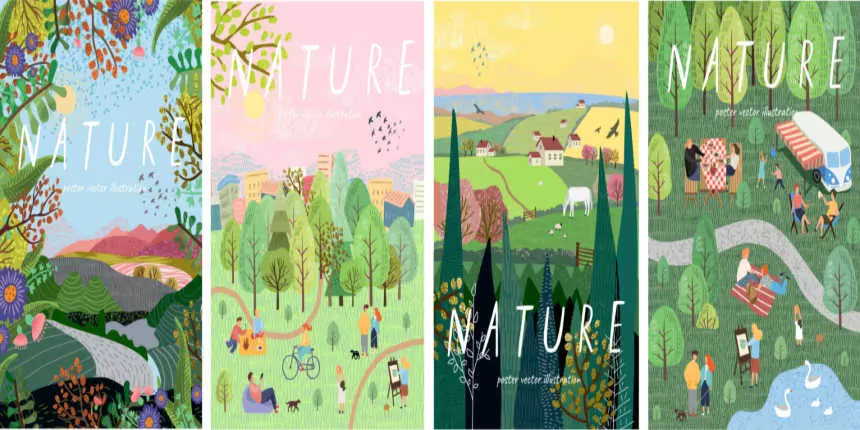
200 Words on Nature Essay
Nature in its purest form is a gift to humanity. One cannot even fathom living without nature.
Nature Provides | Just like a tree depends on the connection of its roots, mankind’s roots are deeply connected to nature. Directly or indirectly, everything that we use and depend upon is provided by nature, which is why we respect it as our mother. Our nature provides us with a variety of beautiful flowers, attractive birds, animals, and green plants; a blue sky, land, running rivers, sea, forests, air, mountains, hills, and much more.
Threats To Nature | Though there are people who, for their own profits, do not hesitate to harm it, they can go to even the lowest of the low, like cutting down trees, destroying lands, and poisoning water sources, just to make a fortune. We need to realise that our selfish and bad activities have disturbed nature to a great extent.
Our Responsibility | We all should try to maintain nature’s beauty. It is our responsibility to protect our nature, as it protects and nurtures us. Because nature is a silent teacher, we must all pledge to protect this valuable asset bestowed upon us. It does not scold, but if the man does not pay attention properly, it does not hesitate to punish.
500 Words on Nature Essay
Nature is both humanity's most valuable and most beautiful asset. It can be said that God designed nature to show his love and care for the beings living on this planet. Today, everyone has less time to enjoy nature. In the increasing crowd, we forgot to enjoy nature and improve our health. We started using technological instruments for our health and fitness. And some of the things we do have a negative impact on nature.
Mother Nature
We respect nature as our mother and call it “Mother Nature” because, just like a mother for her child, Mother Nature fulfils our needs and nurtures us like her children. She provides us food to eat, water to relieve our thirst, a place to live, scenes to enjoy, and medicines, and just like a mother, she teaches us important lessons, sometimes even through hard experiences. But above that, we are totally dependent on her existence.
Things to Learn from Nature
Nature has a plethora to teach human beings. Here are a few of them:-
Essential Resources | Using the healthy food and drink that nature provides, we can live a healthy lifestyle. In a similar way, it gives us food and water so we can function. The two essential components for survival, rainfall and sunshine, are produced by nature.
Discipline | Nature also teaches us to appreciate the time and use it wisely because life is short and time is fleeting. Every day, the sun rises. The uninterrupted cycle of nature teaches us the value of discipline and punctuality.
Patience And Perseverance | It teaches us to work tirelessly toward our objective while continuing to flow forward like a river. Additionally, it conveys a message of bravery and hope. Even though nature suffers, it continues. With patience, we can continue and are certain to succeed, just as the sun emerges from the darkness of night after the darkest hour.
Necessity of Conservation
Recently, our family went to a neighbouring state. It was beautiful and scenic the last time we visited, but this time it was not the same; the air was polluted and the water was black due to industrial waste. The industries and construction had ruined the place; it used to be a sight to see, but now the pollution won’t even let us see the clear blue sky.
If we want to protect the environment, we must act quickly and forcefully to stop any further harm. Preventing deforestation at all levels is the most crucial action. All industries must strictly avoid polluting ocean water because it significantly worsens water scarcity. The excessive use of appliances like ovens, air conditioners, and cars results in large amounts of chlorofluorocarbons, which deplete the ozone layer. As a result, there is global warming, which results in thermal expansion and glacier melting.
In conclusion, nature possesses a potent transformative force that is essential for the continuation of life as we know it. It is our responsibility to protect it for the benefit of future generations because it is necessary for humanity to thrive. To ensure that life on Earth can last indefinitely, we must work hard to preserve natural resources.
Applications for Admissions are open.

JEE Main Important Physics formulas
As per latest 2024 syllabus. Physics formulas, equations, & laws of class 11 & 12th chapters

UPES School of Liberal Studies
Ranked #52 Among Universities in India by NIRF | Up to 30% Merit-based Scholarships | Lifetime placement assistance

Aakash iACST Scholarship Test 2024
Get up to 90% scholarship on NEET, JEE & Foundation courses


JEE Main Important Chemistry formulas
As per latest 2024 syllabus. Chemistry formulas, equations, & laws of class 11 & 12th chapters

PACE IIT & Medical, Financial District, Hyd
Enrol in PACE IIT & Medical, Financial District, Hyd for JEE/NEET preparation

ALLEN JEE Exam Prep
Start your JEE preparation with ALLEN
Download Careers360 App's
Regular exam updates, QnA, Predictors, College Applications & E-books now on your Mobile
Certifications
We Appeared in
Essay About the Beauty of Nature: 4 Examples and 9 Prompts
Read this article for essay examples and prompts to use so you can start writing essay about the beauty of nature.
Nature is complex and beautiful. Our ecosystem covers every aspect of Mother Earth, including the evolution of the earth & life, the various cycles, all the living things, and more. Collectively, they create something so beautiful and perfect that it can be hard to believe it exists.
The beauty and power of nature can be pretty overwhelming. Whenever you want to feel these emotions, reading or writing essays about the beauty of nature can help you grasp those ideas.
Below are examples of essays on nature and its beauty and prompts to help you get started on your next essay.
1. Essay on Beauty of Nature for Children and Students on Study Mentor
2. descriptive essay on beauty of nature on performdigi, 3. essay on beauties of nature by gk scientist, 4. descriptive essay on mother nature by neetu singh, 1. activities that appreciate nature, 2. the beauty of nature in renaissance art, 3. mindful methods of appreciating the beauty of nature, 4. literature pieces that define the beauty of nature well, 5. video games that captured the beauty of nature, 6. beautiful nature photo ideas and tips you can do with a phone, 7. difference between nature and science, 8. philosophical understanding of nature, 9. biomimicry: nature-inspired engineering.
“Each and everything in nature, including living or non-living organisms, play an important role in maintaining the balance to create a viable environment for all of us, which is called ecological balance. We need to make sure that the ecological balance should be maintained at all times to avoid a catastrophic situation in the future.”
The first essay discusses nature’s significance, the natural resources, and how to conserve them. It has an educational tone, encouraging the reader to care for nature and protect its beauty. The second essay focuses on the non-harmful ways of enjoying nature and protecting it from modern daily processes. You might also like these authors like Wendell Berry .
“Nature has many faces. They are everywhere. The human eye is always in contact with good things.”
This descriptive essay about the beauty of nature discusses the immortal, infinite, and eternal beauty of nature and nature as a reflection of the art of Allah. It covers the beauty of everything found in nature, including the changing seasons, birds, beasts, fish, reptiles, humans, the environment, and more.
“To enjoy these beauties of nature, one has to live in nature’s company. A countryman enjoys nature well. A town dweller cannot enjoy the beauties of nature.”
This essay on nature talks about nature and personifies it as a woman by using the pronouns she and her. The essay considers the various elements in nature, seasons, and unique environments. It also provides some wisdom to encourage the reader to care for nature.You might also be interested in these articles about the beauty of nature .
“As nature is the main life force of all living beings on earth. It is our duty to preserve and protect nature and all its creations alike. We must also love her in return as she loves us.”
In this essay, nature is God’s most tremendous boon to humanity. Thus, we must protect it from corruption, pollution, and other artificial and harmful manufactured things. The essay also gave examples of environmental problems that have impacted nature significantly. The end of the essay states that we must stand, preserve, and protect nature.
9 Prompts for Writing an Essay About the Beauty of Nature
Writing an essay about the beauty of nature can feel repetitive and overdone. You can avoid repeating the usual themes or ideas you saw above. Instead, use the essay prompts on nature below.
Here’s a tip: If writing an essay sounds like a lot of work, simplify it. Write a simple 5 paragraph essay instead.

Do you want other people to enjoy and appreciate nature? With this essay, you can list the various methods of appreciating nature. The activities can be simple such as planting a tree, hugging a tree, and watching sunsets.
For help with this topic, read this guide explaining what persuasive writing is all about.
Renaissance art is rich with meanings and symbolism portrayed through nature. For example, although flowers universally stand for beauty, different flower types can have different meanings. Dark clouds and streaks of lightning in the skies can portray dark moods or omens. Many renaissance male artists saw nature as a mother, mistress, or bride. If you like interpreting renaissance art, you’ll enjoy this essay topic.
Mindfulness and nature share a very positive relationship. Being in nature can make you more mindful. Being mindful while in nature enhances your connectedness to it. This essay focuses on mindfulness in nature.
Consider your connection to it, be aware of your surroundings, and actively appreciate its various parts. Connecting to nature will open you to change, the natural cycle of life and death, and more.
Literature is more flexible than visual art because it taps the imagination through ideas and concepts rather than images. For example, various poets, writers, and playwrights have likened the beauty of nature to love, characters, powerful forces, and intense emotions.
Avid literature readers will enjoy writing about the beauty of nature through their favorite authors, themes, and stories.
No matter what their genre, more video games today feature realistic graphics. One of the best ways to show off these high-tech graphics is by showing nature’s beauty in a scene or environment.
Some examples of the top video games that have captured the beauty of nature include Ghost of Tsushima, Red Dead Redemption II, and The Last of Us: Part Two. Write about how the beauty of nature can be captured in a video game and the methods used to create vivid digital worlds.
Are you an enthusiast of nature photography and amateur photography? Bring these two things together by writing an essay about taking nature photos with a phone. Write what you learned about taking nature photos.
You can also provide sample nature photos you or others took with a smartphone. Remember, nature photography can cover many subjects, like animals, plants, landscapes, etc.
Have you ever stopped to think about the difference between nature and science? Science has many methodical and measurable aspects and is as young as humanity. The opposite is true for nature because it has existed far longer than humans have. Yet, we can use science to study nature.
When you pick this essay idea, discuss the loose ideas mentioned above in more detail. Researching and reading about nature vs. science can also help. Discuss this in your next essay for an inspiring and intriguing essay topic.
Philosopher students will enjoy writing an essay about the beauty of nature. You can argue that nature does not exist because it is not measurable. It doesn’t exist outside of any solid examples we can give, like the environment, animals, weather, and plants.
You write about the philosophical aspects of nature and use key research to back up your ideas and arguments made in the essay. Look for scientific research papers, books by philosophers, and opinion essays to create this essay.
Biomimicry is a sustainable solution to human challenges. It imitates the designs found in nature’s time-tested strategies and patterns and incorporates them into technology.
This is a fascinating essay topic that can inspire your next written piece. Conduct research into biomimicry, and let the reader know your thoughts and opinions on this subject.
Do you need more inspiration? Read these 13 essays about nature .

Maria Caballero is a freelance writer who has been writing since high school. She believes that to be a writer doesn't only refer to excellent syntax and semantics but also knowing how to weave words together to communicate to any reader effectively.
View all posts
- Show search

Perspectives
The Power of Nature in Cities
December 02, 2016
By Pascal Mittermaier, Former Global Managing Director, Cities
I have always lived in cities. I love the energy, the excitement, the possibility.
But several years ago, I began to see urban life though a new lens. I had a corporate job, and my wife and I were living in Milan with our two small children. Every workday, I would drive them downtown from our home on the outskirts of the city. And every day, we would enter a cloud of smog, where pollution exceeded the safe levels set by the European Union. One study found that breathing Milan’s air exposed us to roughly the same amount of benzene as would smoking 15 cigarettes per day.
I looked at my kindergartner in the backseat and I knew that something needed to change—in my life, and in the way we think about our cities.
Across the world, cities have been cut off from nature. Most city dwellers simply accept that highways and high-rises will be the dominant backdrop to their lives. In some cities, people have resigned themselves to wearing masks or drinking bottled water to protect their health. But I refuse to accept that future for my children. We must bring nature back to our cities and, in doing so, make them vibrant, resilient places where people can thrive.
Today, when I tell people that I work for The Nature Conservancy and that my interest is cities, I sometimes get a puzzled look in response. “Cities?” they’ll say. “What does that have to with nature?”
A lot, I tell them.

We are witnessing one of the greatest shifts in human history. In 1900, less than 14 percent of all people lived in cities. Today more than half of the world’s population lives in urban settings, and that proportion is projected to increase to more than two-thirds by 2050. For example, the population of Shenzhen, China, was 30,000 people in the 1970s. Now it’s more than 11 million. Hundreds of cities that don’t even exist today will spring into existence in the coming decades, and some of them are going to be megacities like Tokyo or Mexico City, with populations of well over 10 million people.
That’s not necessarily a bad thing. Cities are the engines of the economy, accounting for more than 80 percent of our global GDP—yet they cover only about 3 percent of Earth’s surface. Getting lots of people to live close together makes creative and efficient use of our energy, our water, our sewer systems and our land. Yet many people still see urbanization as a destructive force that displaces and extinguishes nature. That may have been true in the past—and may continue to be true when cities are unplanned—but urban living can lead to more efficient use of resources and smaller carbon footprints. We have learned better ways to design and run our cities so that they are no longer competing with nature but are coexisting with it, or even incorporating it.
While nature needs cities because they represent a resource-efficient way for people to live, cities also acutely need nature. We already know that oyster beds and mangroves shelter coastal cities from storms and that forests in the mountains can protect drinking water. But conservation also can succeed right in the core of an urban area. One of the most inspiring examples I’ve seen of this was in Seoul, where an elevated highway was removed in 2003 and the Cheonggyecheon creek bed below it was restored. The work not only created a much-needed green space for residents but also provided new habitat for birds, fish and insects. It also reduced air-pollution levels and temperatures: The corridor is as much as 5.9 degrees Celsius cooler than paved areas just a few blocks away. Along with the High Line in Manhattan, this project is now among the most studied and copied by urban planners.
Quote : - Pascal Mittermaier
Many people still see urbanization as a destructive force—but urban living can lead to more efficient use of resources and smaller carbon footprints.
- Pascal Mittermaier
Here at the Conservancy, we have launched a program to apply our half century of conservation experience and scientific expertise to city environments. This new work is an expansion of what we already do, rather than a giant leap into the unknown. Consider that we already have some of the best people in the world studying wildlife migrations. They are now helping us understand how cities serve as wildlife corridors. We already have some of the best people in the world measuring water quality. They are now helping us understand the role that nature plays in protecting urban water supplies. And we already have people who excel at crafting partnerships with local communities. Now, more than ever, we need their expertise inside cities.
One of the greatest challenges facing cities and nature today is urban sprawl caused by poor planning. Over the past 30 years, the land area of hundreds of cities has doubled. Many cities are projected to double in size again between now and 2050. The problem is that sprawl makes cities less efficient and destroys valuable natural lands. Around the world, growing cities threaten the populations of 10 to 15 percent of all vertebrate species. In India, one city that I visited is expanding into an elephant migration pathway. In Florida, communities are encroaching on panther habitat.
At the Conservancy, we’re helping cities map out their animal migration pathways and rethink how they design park corridors to better preserve wildlife habitat. For example, as part of the regional conservation alliance Chicago Wilderness, we are helping to conserve urban green spaces and mapping how those habitats can be connected—work that directly benefits the hundreds of bird species that migrate along the shore of Lake Michigan. In Melbourne, we just started developing plans to preserve 120 plant and animal species —including the platypus and rare Australian birds and insects—that are vulnerable to urban expansion.
We’re also helping cities better protect nature by managing their stormwater runoff, which is one of the fastest-growing threats to our waterways. During a rainstorm, water washes over roadways—collecting dirt, oil and debris—and flushes those pollutants into our sewer systems and, ultimately, our rivers and oceans. Some 3,000 U.S. cities have storm sewer systems that do not comply with Clean Water Act requirements. To protect our waterways, cities can build new sewers and water treatment facilities at a cost of billions of dollars—or turn toward natural solutions.

At the Conservancy, we’re helping cities take the natural solutions approach by championing the development of green rooftops, parks and permeable parking lots. For instance, in Bridgeport, Connecticut—which was hammered by Superstorm Sandy—we are helping the city create natural areas along its shoreline to buffer it from storm surges and develop swales—marshy ditches that use native plants to slow down and filter stormwater before it flows into Long Island Sound.
Of all the ways that nature gives back to people in cities, clean air may be the most valuable. In some parts of the world, it can be deadly just to breathe. Smog, soot and other outdoor pollutants—released by a host of human activities, including the burning of wood and fossil fuels, construction, agriculture and mining—cause an estimated 3.7 million premature deaths every year. Yet numerous studies have shown that trees and other types of vegetation are natural air filters, with the ability to reduce particulate-matter concentrations in locations just downwind by 20 to 50 percent.
The Conservancy recently released its first urban air-quality report for 245 cities around the world. It gives urban leaders a blueprint of places where they can green their cities to potentially achieve the greatest reductions in airborne pollution. In Louisville, Kentucky, the Conservancy—together with the University of Louisville, Hyphae Design Laboratory and the Institute for Healthy Air, Water, and Soil—is launching a long-term clinical trial to test whether adding trees and other vegetation to a neighborhood improves residents’ health.
Finally, we are working alongside the people who will make our cities thrive. We’re learning how nature is relevant to the lives of all people, and we’re finding new partners who connect conservation with social justice and public health initiatives. Globally, cities are growing younger, and the Conservancy is looking to the future by working with urban youth, offering summer internships to high school students in dozens of cities and online environmental curricula to 3 million middle school students—and counting. This generation is more likely to live in cities, and they have the power to build communities where people and nature live in balance.
In Philadelphia, I recently had the pleasure of meeting Howard Neukrug, who has led his city in developing an innovative system that uses nature to manage the stormwater that was polluting the Delaware and Schuylkill rivers—the sources of the city’s drinking water. “We build one rain garden,” he said, “add a few street trees, and then … something wonderful happens: The street comes to life. Children play in the new green spaces. Elderly people sit under the trees on hot days. Nature helps a neighborhood rediscover its community.”
The Conservancy is perfectly positioned to help transform the relationship between nature and people so that both can thrive. So, what are we doing in cities? A lot.
Originally Posted on Nature Conservancy Magazine December 02, 2016
Related Reading
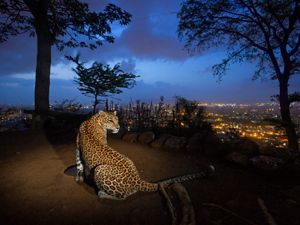
Nature in the Urban Century
Booming cities raise the stakes for biodiversity—here’s how smart urban planning can serve people and nature.

Envisioning a Great Green City
Transforming the way cities interact with nature will mean cities can be resilient, healthy and equitable.

To Protect Nature, Cities Cannot Be An Afterthought
The director of The Nature Conservancy's North America Cities Network offers insights into how to make cities greener and more equitable.
By Meera Bhat
Global Insights
Check out our latest thinking and real-world solutions to some of the most complex challenges facing people and the planet today.

Essay on Benefits of Nature
Students are often asked to write an essay on Benefits of Nature in their schools and colleges. And if you’re also looking for the same, we have created 100-word, 250-word, and 500-word essays on the topic.
Let’s take a look…
100 Words Essay on Benefits of Nature
The healing power of nature.
Nature is a great healer. It brings peace to our minds and bodies. When we spend time in nature, we feel calm and relaxed. It reduces stress and improves our mood.
Nature and Physical Health
Being in nature can also benefit our physical health. It encourages us to exercise and stay active. Walking, running, or playing in green spaces helps us stay fit and healthy.
Learning from Nature
Nature is a fantastic teacher. It teaches us about the cycles of life, the importance of diversity, and the need for balance. It inspires creativity and sparks curiosity in young minds.
250 Words Essay on Benefits of Nature
The therapeutic power of nature.
The natural world has been a source of solace, inspiration, adventure, and delight for generations. It is a sanctuary for the human spirit, offering a sense of peace and tranquility that is often lacking in our fast-paced, technology-driven lives.
Mental Health Enhancement
The benefits of nature on mental health are well-documented. A growing body of research suggests that exposure to natural environments can reduce stress, anxiety, and depression. The calming effect of nature, often referred to as ‘green therapy’, can significantly improve our mood and cognitive functioning.
Physical Health Improvement
In addition to mental health, nature also contributes to our physical well-being. Activities such as hiking, cycling, or simply walking in a park can improve cardiovascular health, enhance physical strength, and boost the immune system. Moreover, exposure to sunlight helps the body produce Vitamin D, crucial for bone health and disease prevention.
Fostering Creativity and Mindfulness
Nature can stimulate our creativity and foster a sense of mindfulness. The beauty and complexity of natural patterns, shapes, and colors can inspire artistic and innovative thoughts. Moreover, the quietude of nature encourages mindfulness, promoting a deep sense of connection with our surroundings and ourselves.
Sustainable Living and Climate Change Mitigation
Finally, nature teaches us the principles of sustainable living. Understanding and appreciating the intricate balance of ecosystems can inspire us to adopt more sustainable practices, reducing our carbon footprint and contributing to climate change mitigation.
In conclusion, the importance of nature in our lives cannot be overstated. As we navigate through the complexities of the modern world, let us remember to take the time to reconnect with nature and reap its numerous benefits.
500 Words Essay on Benefits of Nature
The natural world has a profound impact on our well-being. A growing body of research suggests that exposure to nature can lead to a wealth of health benefits, both physical and mental. The Japanese practice of ‘Shinrin-Yoku’, or ‘forest bathing’, has been scientifically proven to reduce stress levels, lower blood pressure, and improve mood.
The Physical Benefits of Nature
Engaging with nature can have remarkable effects on our physical health. Regular outdoor activities such as hiking, gardening, or simply walking in a park can boost fitness levels and enhance cardiovascular health. The fresh air and sunlight we experience outdoors are rich in vitamin D, which is essential for bone health and has been linked to reduced risks of certain types of cancer and heart disease.
Nature and Mental Health
The mental health benefits of nature are equally significant. Natural environments can act as a buffer against stress, helping to restore our attention and relax our minds. A study published in the journal “Environmental Science & Technology” found that just five minutes of exercise in a green space can dramatically improve mood and self-esteem.
Nature and Cognitive Function
Nature’s impact extends to our cognitive abilities as well. Research indicates that exposure to natural settings can enhance memory and attention span. A study from the University of Michigan found that walks in nature could improve short-term memory by 20%. The calming effect of nature helps to clear the mind, allowing for better concentration and creativity.
Connecting with Nature
Despite these benefits, urbanization and technology have led to a disconnection from nature. It is crucial to reintegrate nature into our daily lives. This can be as simple as taking a walk in a local park, gardening, or even bringing plants into your home or workspace.
Nature and Sustainability
Lastly, immersing ourselves in nature fosters a deeper appreciation for our planet and its ecosystems. This can lead to more sustainable behaviors, such as recycling, composting, and adopting a plant-based diet. These actions not only benefit our health but also contribute to the preservation of our environment.
In conclusion, nature offers a plethora of benefits to our physical and mental well-being. It is a powerful yet underutilized tool for health and happiness. As we move forward in an increasingly urbanized world, it is crucial to reconnect with nature and reap its many benefits.
That’s it! I hope the essay helped you.
If you’re looking for more, here are essays on other interesting topics:
- Essay on Bear
- Essay on Visit to a Bank
- Essay on Privatisation of Banks
Apart from these, you can look at all the essays by clicking here .
Happy studying!
Leave a Reply Cancel reply
Your email address will not be published. Required fields are marked *
Save my name, email, and website in this browser for the next time I comment.

Natural Resources Institute
Division of Extension

The Power of Nature
- Share on Facebook
- Share on X (Twitter)
- Share via Email
When natural disasters strike, we are reminded of nature’s power to alter our lives and communities in profound ways. With such visible damage, it can be easy to forget nature also has the immense power to positively impact human health and well-being. Consider a simple walk through a prairie, a paddle down the Wisconsin River, casting a line off a dock or a hike to a favorite waterfall—even memories of these activities can have a positive effect on your physical health and mental well-being.
As the director of the Wisconsin Master Naturalist program, I have had the opportunity to see exactly how time spent in nature positively impacts individuals. I have a wall of thank-you notes describing the rewards of being in nature and networking with like-minded individuals. The notes discuss the sense of peace and calm that being in nature provides and the call to action it invokes to protect these places and teach others about their value.
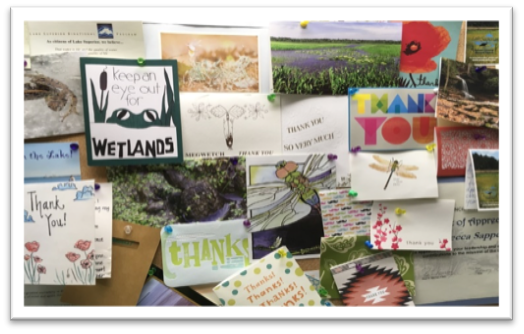
Science agrees. A study done at Stanford University and published in the Proceedings of the National Academy of Science showed that a 90-minute walk in nature had a greater effect on the area of the brain linked to mental illnesses than a walk through an urban area. The researchers suggest that having access to natural areas is essential for mental health. It’s also important in building community. In their field studies at the Human-Environment Research Lab, Kuo and Coley found that spending time in an area with natural landscaping connects people in urban environments not only to a broader natural environment but also to their social community.
Exposure to nature can also benefit physical health. In his recent article on ecopsychology , Jim Robbins discusses how being outside can reduce blood pressure, heart rate, muscle tension and the production of stress hormones, which lessens anxiety and improves moods. Studies have even shown that exposure to natural materials like plants, trees and water can help people cope with pain and distract them from discomfort. And people are starting to take note. Robbins explains how this research is now reaching the ears of policymakers, employers and healthcare providers who are looking at ways to address the beneficial effects of spending time in nature.
This is not new knowledge. Researchers in the early 1980s looked at the recovery rates of patients whose rooms faced a courtyard versus those that faced a brick wall. Recovery rates for patients with a view of a courtyard were shortened, fewer negative comments were recorded by nurses and they needed less pain medication than patients without views to a natural environment.
Just last year, I reached out to a group of Master Naturalists who are also veterans and asked them about their connection to nature. The replies came quickly and represented a variety of ages, genders and life experiences. Their comments reinforced the research showing that spending time in nature can soothe stress, improve moods, expand thinking and bring more meaning to life.
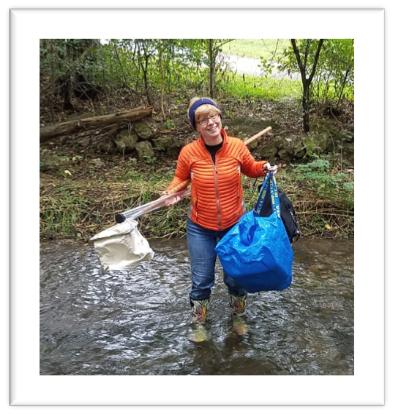
Master Naturalist and Navy veteran Jim Killian said he always found his time spent outdoors to be healing, even prior to his military service. With more active involvement through the Wisconsin Master Naturalist program and his stewardship site restoration work at Kishwauketoe Nature Conservancy in Williams Bay, he believes his “nature time” has become even more important. Killian is an active volunteer in a variety of capacities throughout his community, but he says he finds his naturalist work to be the most meaningful: every moment spent out in nature is restorative to mind, body and soul alike. Robert Bennicoff, another Navy veteran and Master Naturalist, echoes Killian’s point of view. “Being out in nature is incredibly important to me, my wife, children as well as grandchildren. It is an opportunity to ‘turn the pump off’ and let the sounds and sights of nature around me recharge my soul.”
“I am drawn to working/learning in nature and understanding its calming power. For me, working with either youth or adults to more fully understand, take care of a woodlot, prairie or wetland gives me a satisfaction that relaxes and encourages.” -Phil Kress, Master Naturalist and Army Veteran
Our communities are strong with nature centers, non-profits, local and state parks and national forests that give us opportunities to heal ourselves on the trail, in the water, across the prairie and even in our own backyards. But the relationship between people and nature should not be one-sided. The natural world also requires care and maintenance. Programs like Wisconsin Master Naturalist are necessary because they support the health and wellbeing of both people and land while maximizing the symbiotic relationship between the two. Our rich natural world will help Wisconsinites make it through challenging times now and in the future as long as we continue to take care of it.
Becky Sapper is the program director for the Wisconsin Master Naturalist Program.
We teach, learn, lead and serve, connecting people with the University of Wisconsin, and engaging with them in transforming lives and communities.
Explore Extension »
Connect with your County Extension Office »

Find an Extension employee in our staff directory »

Get the latest news and updates on Extension's work around the state

Feedback, questions or accessibility issues: [email protected] | © 2024 The Board of Regents of the University of Wisconsin System Privacy Policy | Non-Discrimination Policy & How to File a Complaint | Disability Accommodation Requests
An EEO/AA employer, University of Wisconsin-Madison Division of Extension provides equal opportunities in employment and programming, including Title VI, Title IX, the Americans with Disabilities Act (ADA) and Section 504 of the Rehabilitation Act requirements.
Nature Essay
500+ words essay on nature.
Nature is the most precious gift of God to us. Nature is like our mother; it nourishes and nurtures us. All our basic necessities are fulfilled by nature. Whether it’s the air we breathe, the land we live on, the water we drink or the food we eat, it all comes from nature. God has only gifted earth with nature; that’s why life is possible on earth. Without nature, the existence of living things would not be possible. Other planets are not blessed with this gift. So, we should be thankful to God for this beautiful nature and the existence of life on earth. Here, students can find the 500+ Words Essay on Nature. This essay will guide them in writing a good Essay on Nature and work as a sample essay for them. By going through it, students can create their own Nature Essay in English.
Nature is the natural, physical, material world or universe. “Nature” can refer to the phenomena of the physical world, and also to life in general. It ranges in scale from the subatomic to the cosmic. Our planet is rich in nature. Natural things look beautiful and attractive. Nature has flowing rivers, beautiful valleys, high mountains, singing birds, the oceans, the blue sky, different seasons, the rain, the beautiful moonlight etc. The beauty of nature is matchless. The blessings of nature on human beings are innumerable.
Importance and Role of Nature
If there were no nature, we wouldn’t be alive. Humankind is dependent on nature. We get oxygen to breathe from plants and trees. Thus, our respiratory system is regulated by nature. Not only this, nature has some magical healing powers which help patients suffering from various diseases to recover faster. Every minute spent in the lap of nature gives a refreshing and rejuvenating feeling. It lowers the cortisol, commonly known as the stress hormone. Even placing some nice plants around the work window will lead to lower stress. Nature enhances our brain’s activity and makes us concentrate better and be more focused. This makes our brains more creative and imaginative. Spending time in nature will provide a healthier and longer life.
Nature is very powerful and unique. Nature is also considered a source of education. We can learn humility from trees, the sturdiness from the mountains, and to smile from flowers and buds to keep smiling in tough phases of life.
The natural cycle of our ecosystem is very necessary. Ecosystems contain biotic or living parts, as well as abiotic factors or nonliving parts. Biotic factors include plants, animals, and other organisms. Abiotic factors include rocks, temperature, and humidity. Every factor in an ecosystem depends on every other factor, either directly or indirectly. We must take care of all the components of the ecosystem as it fulfils all our needs.
Nature Conservation
The resources provided on the earth are limited. If we continue to deplete the resources at this pace, then they will soon exhaust. Urbanisation and development have resulted in excessive use of resources. For example, we are cutting trees to make houses, roads, and railway tracks. We are mining minerals and fossil fuels for transportation activities. We are extensively using water for agriculture and other activities. Our comfort has led to the destruction of nature. Deforestation, global warming, wildlife destruction, environmental pollution, ecosystem imbalance etc., are the consequences that threaten biodiversity and life on earth. To overcome them, we need to conserve nature.
Conserving nature means protecting, preserving and restoring biodiversity. We can do so by taking care of small things such as making use of: Refuse, Reduce, Reuse, Repurpose, Recycle. It will help in reducing waste management. We should plant trees in our surroundings and increase the greenery around us. Conserving water and saving it is also a way of conserving nature. We can also conserve rainwater by adopting the rainwater harvesting method. We must use and promote alternative energy sources such as solar energy and wind energy and thus adopt sustainable development concepts. We can conserve nature by taking care of small activities at home. These activities include switching off the lights, fans, and AC when not in use, switching to public transport and carpooling, composting waste at home, using recyclable bags and containers, and educating our children about climate change and nature conservation.
We hope students must have found this Essay on Nature helpful in improving their writing section. For more study material and the latest updates on CBSE/ICSE/State Board/Competitive exams, keep visiting BYJU’S. Moreover, download the BYJU’S App to get interactive study videos.
Frequently Asked Questions on Nature Essay
Why is the conservation of nature important.
Humankind is completely dependent on nature and we are now depleting nature of all its resources. It is extremely important to understand that without nature, it would be impossible for any species to thrive on Earth.
What steps can we take to conserve nature?
All of us need to take at least small, minimal efforts from our side like recycling plastic, reducing wastage of all forms and keeping our house and surroundings clean.
How can we control the depletion of nature?
As much as possible, avoid purchasing unnecessary items as this will lead to waste accumulation. Avoid goods made from animal skin(leather), etc and try to reuse and recycle plastic and non-biodegradable items
Leave a Comment Cancel reply
Your Mobile number and Email id will not be published. Required fields are marked *
Request OTP on Voice Call
Post My Comment
- Share Share
Register with BYJU'S & Download Free PDFs
Register with byju's & watch live videos.

Counselling

Environment
The healing power of nature, should we consider nature as medicinal.
Posted November 4, 2021 | Reviewed by Vanessa Lancaster
- Nature is the purest pathway to inner peace, and it recharges one’s energy and renovates the personality.
- A study showed that when participants were exposed to nature scenes, their brain parts linked with empathy and love lit up.
- Researchers suggested that a nature view helps patients tolerate pain, overcome adverse effects, and have less stay at the hospital.
The pathless woods, serene sights, and melodious songs of birds are natural treasures that one can yearn for at any cost. Nature is the purest pathway to inner peace, and it recharges one’s energy and renovates the personality . We feel blessed when we get a chance to breathe in a pollution-free environment, and we inhale clean air and smell the fragrance of flowers. Japanese researchers have dug deep to bring forward the benefits of forest bathing – walking in the woods.

Harmony for the Mind
The time spent among trees is a respite for the exhausted minds, refreshing for new goals . Nature helps us deal with the over-activity of the mind and relaxes us with its soothing environment.
We can release stress and inhale the breaths that calm down our chaotic thoughts. Research on ADHD children shows that the attention span of children improves after spending time in nature. Another study showed that when participants were exposed to nature scenes, their brain parts linked with empathy and love lit up.
Strength for the Soul
Being in nature helps us connect with our soul on a more profound level. Our five senses are fully activated, and our soul develops a strong bond with the natural world. The lovely scent of trees and flowers introduces us to ethereal beauty. We gain spiritual power by responding to the rhythm of nature. We acquire the pleasure of mindfulness , and we start enjoying the little moments in our lives.
Calmness for the Body
When you are exposed to nature, you heal emotionally and feel pleasant. Nature is a tonic for physical well-being. It reduces blood pressure, stables heart rate, and decreases the production of stress hormones . One study suggested that the nature view helps patients tolerate pain more, overcome adverse effects, and have less stay at the hospital.
Nature has a magical impact on our health; it reduces inflammation and prevents many diseases by boosting immunity.
We must invest our time to extract eternal peace of mind, body, and soul in this urban century. The rejuvenation of positive energy will empower us to perform our tasks with a happy and healthy mindset.
https://e360.yale.edu/features/ecopsychology-how-immersion-in-nature-be…
https://www.shondaland.com/live/body/a33252244/the-healing-powers-of-na…
https://www.takingcharge.csh.umn.edu/how-does-nature-impact-our-wellbei…

Franchell Hamilton, M.D., is trained not only in medicine and surgery but also in chemistry and psychology. Her passion is to transform health through both traditional and alternative medicine with a focus on finding the root cause of disease.
- Find a Therapist
- Find a Treatment Center
- Find a Psychiatrist
- Find a Support Group
- Find Online Therapy
- International
- New Zealand
- South Africa
- Switzerland
- Asperger's
- Bipolar Disorder
- Chronic Pain
- Eating Disorders
- Passive Aggression
- Personality
- Goal Setting
- Positive Psychology
- Stopping Smoking
- Low Sexual Desire
- Relationships
- Child Development
- Therapy Center NEW
- Diagnosis Dictionary
- Types of Therapy

Understanding what emotional intelligence looks like and the steps needed to improve it could light a path to a more emotionally adept world.
- Emotional Intelligence
- Gaslighting
- Affective Forecasting
- Neuroscience
Essay on Nature
Here we have shared the Essay on Nature in detail so you can use it in your exam or assignment of 150, 250, 400, 500, or 1000 words.
You can use this Essay on Nature in any assignment or project whether you are in school (class 10th or 12th), college, or preparing for answer writing in competitive exams.
Topics covered in this article.
Essay on Nature in 150-250 words
Essay on nature in 300-450 words, essay on nature in 500-1000 words.
Nature is a precious gift that surrounds us, encompassing the world’s landscapes, ecosystems, and living beings. It is a source of immense beauty, inspiration, and solace. From towering mountains to vast oceans, lush forests to serene meadows, nature provides us with breathtaking sights and a sense of awe.
Nature is not only visually captivating but also essential for our survival and well-being. It sustains life by providing clean air, fresh water, and fertile soil. It is home to a diverse array of plants and animals, each playing a vital role in maintaining ecological balance.
Furthermore, spending time in nature has numerous benefits for our physical and mental health. It rejuvenates our spirits, reduces stress, and enhances our overall well-being. Immersing ourselves in nature’s tranquility allows us to disconnect from the fast-paced world and reconnect with our inner selves.
However, human activities have taken a toll on nature. Deforestation, pollution, and climate change threaten the delicate balance of ecosystems and the survival of countless species. It is our responsibility to protect and conserve nature for future generations.
Appreciating nature’s beauty and recognizing its significance is crucial. We must strive to live in harmony with nature, practicing sustainable lifestyles and preserving natural resources. By valuing and respecting nature, we can ensure its preservation and continue to enjoy its countless gifts.
In conclusion, nature is a precious and awe-inspiring entity that sustains life and provides solace and inspiration. It is essential for our physical and mental well-being. As stewards of the Earth, it is our responsibility to protect and conserve nature, ensuring its preservation for future generations to cherish and enjoy.
Nature is a magnificent and awe-inspiring gift that surrounds us, encompassing the diverse landscapes, ecosystems, and living beings that make up our planet. From the majestic mountains to the serene lakes, from the vibrant forests to the vast oceans, nature captivates us with its beauty, power, and serenity.
Nature provides us with numerous benefits and is essential for our survival and well-being. It is the source of clean air, freshwater, and fertile soil that sustains life on Earth. The intricate web of ecosystems, comprising plants, animals, and microorganisms, works together to maintain the delicate balance of nature.
Beyond its practical importance, nature has a profound impact on our physical and mental health. Spending time in nature has been shown to reduce stress, improve mood, and enhance overall well-being. The sight of a breathtaking sunset, the sound of waves crashing on the shore, or the touch of grass beneath our feet can have a soothing and therapeutic effect, allowing us to reconnect with ourselves and find solace in the beauty of the natural world.
Unfortunately, human activities have had a detrimental impact on nature. Deforestation, pollution, climate change, and habitat destruction threaten the delicate balance of ecosystems and the survival of countless species. It is imperative that we recognize the urgency of preserving and protecting nature for future generations.
Conservation and sustainable practices are vital for ensuring the continued well-being of our planet. We must strive to live in harmony with nature, embracing sustainable lifestyles and adopting practices that minimize our ecological footprint. This includes reducing waste, conserving energy and water, practicing responsible consumption, and supporting conservation efforts.
Furthermore, education and awareness play a crucial role in fostering a deeper appreciation and understanding of nature. By learning about the intricate interconnectedness of ecosystems and the importance of biodiversity, we can develop a sense of responsibility and take action to protect and conserve the natural world.
Preserving nature is not just about ensuring our own well-being; it is a moral obligation to future generations and a commitment to the intrinsic value of all living beings and ecosystems. By valuing and respecting nature, we can create a more sustainable and harmonious future, where humans coexist with the natural world in a mutually beneficial relationship.
In conclusion, nature is a source of wonder, beauty, and vital resources. It sustains life, nourishes our souls, and provides us with a profound sense of connection. As custodians of the Earth, it is our responsibility to protect and preserve nature, adopting sustainable practices and fostering a deep appreciation for the natural world. By doing so, we can ensure a vibrant and thriving planet for ourselves and future generations to enjoy and cherish.
Title: Nature – A Pristine Gift Nurturing Life and Inspiring the Human Spirit
Introduction :
Nature, with its awe-inspiring landscapes, diverse ecosystems, and intricate web of life, is a pristine gift that surrounds us. It captivates us with its beauty, serenity, and transformative power. This essay explores the profound relationship between humans and nature, highlighting its importance for our physical, mental, and spiritual well-being. It also emphasizes the urgent need to protect and preserve nature in the face of environmental challenges.
The Beauty and Diversity of Nature
Nature encompasses a vast array of breathtaking landscapes, from snow-capped mountains to lush forests, from vast oceans to tranquil meadows. Each holds its unique charm, captivating us with its grandeur, tranquility, and raw beauty. From the vibrant colors of blooming flowers to the graceful flight of birds, nature’s diversity evokes wonder and ignites our imagination.
Nurturing Life and Ecosystems
Nature sustains life on Earth, providing vital resources and supporting intricate ecosystems. It supplies us with clean air, freshwater, and fertile soil, enabling the growth of crops and the survival of diverse species. The delicate balance of ecosystems ensures the survival of plants, animals, and microorganisms, each playing a crucial role in maintaining biodiversity and ecological harmony.
Physical and Mental Well-being
Spending time in nature has numerous physical and mental health benefits. It reduces stress, anxiety, and depression, promoting a sense of calm and well-being. The healing power of nature can be seen in activities such as forest bathing, where individuals immerse themselves in natural environments to enhance their overall health. Nature provides a respite from the fast-paced urban life, allowing us to disconnect, recharge, and rejuvenate our spirits.
Inspiration and Spiritual Connection
Nature inspires us and stirs our innermost emotions. The grandeur of a mountain range, the rhythmic crashing of waves, or the delicate beauty of a flower can evoke a profound sense of awe and wonder. Nature’s beauty stimulates our creativity, kindles our imagination, and nurtures our spirit. It serves as a reminder of our place in the larger tapestry of life, connecting us to something greater than ourselves.
Environmental Challenges and the Need for Conservation
Nature is facing unprecedented challenges due to human activities. Deforestation, pollution, climate change, and habitat destruction pose significant threats to the delicate balance of ecosystems and the survival of countless species. The urgency to protect and preserve nature has never been greater. Conservation efforts, sustainable practices, and environmental awareness are crucial in mitigating these challenges and ensuring a sustainable future.
Cultivating a Connection with Nature
To protect and preserve nature, it is essential to cultivate a deep connection and appreciation for the natural world. Education plays a vital role in fostering environmental awareness and instilling a sense of responsibility. Encouraging outdoor experiences, nature-based activities, and environmental stewardship programs can nurture a love for nature and promote a sense of guardianship of the planet.
Conclusion :
Nature is a remarkable and invaluable gift, nurturing life, inspiring the human spirit, and offering solace and serenity. It is essential for our physical, mental, and spiritual well-being. However, it faces significant challenges that threaten its delicate balance and the well-being of future generations. By protecting and preserving nature, adopting sustainable practices, and fostering a deep connection with the natural world, we can ensure a vibrant and thriving planet for ourselves and future generations to enjoy and cherish. Let us embrace our role as stewards of the Earth and work collectively to safeguard nature’s invaluable gifts.
Related Posts

Essential Elements of Valid Contract (Explained With Examples)

What is World Population? Main Causes, Effects, Top 20 Countries
- International edition
- Australia edition
- Europe edition

Written in the wild: the best radical nature writing
From This Land Is Our Land to Why Rebel, the message is that if we take heed of the natural world, we can heal ourselves
E nglish nature writing can be a bit polite. Decorating nature with adjectives has become something of a fashion in the last decade, but there are some books whose verve is a wildflower seed bomb to the neat lawns of English prose.
Principal among these are any of the books written by the magus of human experience in the wild, Jay Griffiths. From Wild , to Kith , to Why Rebel , her latest collection of essays, there is an energy in her words that feels like being chased by wolves. Best of them all is Tristimania: A Diary of Manic Depression , which describes with hyperreal force the electrical storms of the mind, the eerie twilight of mania.
There are many books that shine a light on the otherwise unmentioned elephant in the room of writing about English nature: that we are allowed access to so little of it. Andro Linklater’s Owning the Earth deals with the issue on a global level, and Guy Shrubsole’s excellent Who Owns England? focuses on this country. Ask any land rights campaigner, and the book that inspired them was Marion Shoard’s This Land Is Our Land . Shoard worked for several years for CPRE, the countryside charity, and was fully integrated into the system of land ownership in England and yet, or thus, wrote three excoriating books about its iniquities: The Theft of the Countryside , Right to Roam , and This Land Is Our Land . The last is a comprehensive history of how we lost our rights to land, from William the Conqueror to the modern day.
At long last, the gates to the English garden of nature writing are being prised open by a new generation of talent from communities previously marginalised from both the countryside and the publishing industry. Jini Reddy’s Wanderland deals with the sense of feeling unwelcome in a predominantly white landscape. It primarily seeks a connection of magic between the human and non-human, something deeper than our obsession with leisure and recreation.
The book that most informs the dynamic of race in the English countryside for me is Capitalism and Slavery by Eric Williams. It is a detailed account of the horror at the heart of racism, how it was used to justify the profiteering of sugar barons. It hammers home the point that by objectifying and commodifying nature, we do the same to each other.
Rob Cowen’s recent collection of poems focuses on our recent year of lockdown, emphasising how desperately we need to connect with nature. Mixing the deeply personal with policy and propaganda, interweaving the callous coldness of the wild, from sparrowhawks to viruses, with the regenerative and ebullient effects of nature, The Heeding reminds us what, with a thousand years of exclusion, most of us had forgotten until lockdown: take heed of nature, and we can heal ourselves.
- Science and nature books
- Further reading
Most viewed
Home — Essay Samples — Entertainment — Billy Elliot — Billy Eliot: The Power Of Nurture Over Nature
Billy Eliot: The Power of Nurture Over Nature
- Categories: Billy Elliot Film Analysis Film Editing
About this sample

Words: 1200 |
Published: Apr 11, 2022
Words: 1200 | Pages: 3 | 6 min read

Cite this Essay
Let us write you an essay from scratch
- 450+ experts on 30 subjects ready to help
- Custom essay delivered in as few as 3 hours
Get high-quality help

Prof. Kifaru
Verified writer
- Expert in: Entertainment

+ 120 experts online
By clicking “Check Writers’ Offers”, you agree to our terms of service and privacy policy . We’ll occasionally send you promo and account related email
No need to pay just yet!
Related Essays
3 pages / 1291 words
1.5 pages / 750 words
4.5 pages / 1994 words
6.5 pages / 2866 words
Remember! This is just a sample.
You can get your custom paper by one of our expert writers.
121 writers online
Still can’t find what you need?
Browse our vast selection of original essay samples, each expertly formatted and styled
Related Essays on Billy Elliot
The controversy surrounding Brett Easton Ellis's American Psycho and Anthony Burgess's A Clockwork Orange relates primarily to the central themes that are explored in both books. Nevertheless, the brutality and explicit [...]
"The woman looked at the tree: the fruit would be good to eat; it was pleasing to the eye and desirable for the knowledge it could give. So she took some and ate it; she also gave some to her husband and he ate it. Then they [...]
Anthony Burgess’s A Clockwork Orange is a novel pervaded by a multifaceted and intrinsic musical presence. Protagonist Alex’s fondness for classical music imbues his character with interesting dimensions, and resonates well [...]
Following the publication of his most notable work, A Clockwork Orange, Anthony Burgess commented on the function of literature in a mutable society. There is not much point in writing a novel unless you can show the possibility [...]
Many philosophers have believed for centuries that no intrinsic meaning exists in the universe. From this belief emerged many responses, including absurdism and existentialism. Although all are heavily influenced by the beliefs [...]
The literary canon is comprised of texts said to be of considerable value, texts regarded as experimentally profound and which may even be said to change the way the reader perceives the world. A Clockwork Orange can be [...]
Related Topics
By clicking “Send”, you agree to our Terms of service and Privacy statement . We will occasionally send you account related emails.
Where do you want us to send this sample?
By clicking “Continue”, you agree to our terms of service and privacy policy.
Be careful. This essay is not unique
This essay was donated by a student and is likely to have been used and submitted before
Download this Sample
Free samples may contain mistakes and not unique parts
Sorry, we could not paraphrase this essay. Our professional writers can rewrite it and get you a unique paper.
Please check your inbox.
We can write you a custom essay that will follow your exact instructions and meet the deadlines. Let's fix your grades together!
Get Your Personalized Essay in 3 Hours or Less!
We use cookies to personalyze your web-site experience. By continuing we’ll assume you board with our cookie policy .
- Instructions Followed To The Letter
- Deadlines Met At Every Stage
- Unique And Plagiarism Free
- International
- Schools directory
- Resources Jobs Schools directory News Search

AQA Exemplar Ozymandias & Storm on the Island
Subject: English
Age range: 14-16
Resource type: Assessment and revision
Last updated
5 February 2020
- Share through email
- Share through twitter
- Share through linkedin
- Share through facebook
- Share through pinterest

AQA Grade 9 Exemplar full response to “how is Power of nature explored” . The model essay compares nature in poems ‘Ozymandias’ and ‘Storm on the Island’ . This resource models an answer to Paper 2 Section B on the ‘Power and Conflict’ section of the anthology. Ideal for use with top set students who are struggling to breach the gap between grade 7-8 and grade 9. Preview is one of the paragraphs.
File type: Word Document
Tes paid licence How can I reuse this?
Get this resource as part of a bundle and save up to 34%
A bundle is a package of resources grouped together to teach a particular topic, or a series of lessons, in one place.
AQA Literature Grade 9 Exemplars Bundle
Bundle of Grade 9 Exemplar responses to AQA English Literature. The responses cover Dr Jekyll & Mr Hyde, Lord of the Flies and the 'Power and Conflict' anthology.
Your rating is required to reflect your happiness.
It's good to leave some feedback.
Something went wrong, please try again later.
Have just bought this and it's terrible! Lots of it doesn't actually make sense - this is not a grade 9 essay!
Empty reply does not make any sense for the end user
Report this resource to let us know if it violates our terms and conditions. Our customer service team will review your report and will be in touch.
Not quite what you were looking for? Search by keyword to find the right resource:

COMMENTS
The beauty of nature has the power to ignite our imagination, stimulate our senses, and evoke a sense of wonder and awe. From the paintings of Claude Monet to the poetry of William Wordsworth, the natural world has served as a muse for countless works of art and literature. Research has shown that exposure to natural environments can enhance ...
Nature Summary: "Nature" is an essay by Ralph Waldo Emerson that was first published in 1836. In this work, Emerson reflects on the beauty and power of nature and argues that it can serve as a source of inspiration and enlightenment for individuals. He encourages readers to look beyond the surface of nature and appreciate its underlying ...
500+ Words Nature Essay. Nature is an important and integral part of mankind. It is one of the greatest blessings for human life; however, nowadays humans fail to recognize it as one. Nature has been an inspiration for numerous poets, writers, artists and more of yesteryears. This remarkable creation inspired them to write poems and stories in ...
Essay: The Healing Power of Nature. October 15, 2019. While waiting for a hike to begin during Earth Week last spring at Kehl Lake, I felt my phone buzzing in my pocket. Glancing at the screen, I saw it was a close friend of mine, a college roommate, who dislikes talking on the phone, and almost never calls. I picked up.
Another story in the series focuses on Bikini Atoll. Between 1946 and 1958, the United States detonated 23 nuclear bombs on the atoll in the Pacific Ocean as part of a weapons-testing program. The local coral reefs were annihilated and the islands were too contaminated for displaced residents to be resettled.
1 IT CAN LOWER BLOOD PRESSURE. Spending time outside is good for the heart, research shows, and since high blood pressure costs the U.S. approximately $48.6 billion per year and affects 1 in 3 ...
Here are some of the ways that science is showing how being in nature affects our brains and bodies. Peter Morgan, Auyuittuq National Park. 1. Being in nature decreases stress. It's clear that hiking—and any physical activity—can reduce stress and anxiety. But, there's something about being in nature that may augment those impacts.
Analysis. If a person spends time in solitude in nature—like if they look at the stars—it will allow them to temporarily transcend their day-to-day lives and connect with the sublime. Since the stars shine nearly every night, people take their beauty for granted. But a wise person never takes nature's beauty for granted and never loses ...
Drawing on the ideas of Transcendentalist writer Amos Bronson Alcott (whom Emerson refers to in the essay as the "Orphic poet"), Emerson explains that humans have corrupting desires—like the desire for wealth, power, pleasure, or praise—and that giving in to those desires further disconnect people from nature. Living in a society that ...
During his journey in a boat, the young boy is forced to realise the awesome power of nature: 'One summer evening'. Small circles glittering idly in the moon'. 'summit of a craggy ridge, The horizon's utmost boundary'. 'far above Was nothing but the stars and the grey sky'. 'the grim shape Towered up between me and the stars'.
100 Words Essay on Nature. Nature is everything around us; even those things that we cannot see, such as microorganisms, are part of nature. Mankind is so dependent on nature; it provides everything that we need. The spices that make our food delicious, the water without which the existence of life is impossible—all are provided by nature ...
2. The Beauty of Nature in Renaissance Art. Renaissance art is rich with meanings and symbolism portrayed through nature. For example, although flowers universally stand for beauty, different flower types can have different meanings. Dark clouds and streaks of lightning in the skies can portray dark moods or omens.
The Power of Nature in Cities. I have always lived in cities. I love the energy, the excitement, the possibility. But several years ago, I began to see urban life though a new lens. I had a corporate job, and my wife and I were living in Milan with our two small children. Every workday, I would drive them downtown from our home on the outskirts ...
250 Words Essay on Benefits of Nature The Therapeutic Power of Nature. The natural world has been a source of solace, inspiration, adventure, and delight for generations. It is a sanctuary for the human spirit, offering a sense of peace and tranquility that is often lacking in our fast-paced, technology-driven lives.
The Power of Nature. Written by Jenna Mertz Posted on February 11, 2021. When natural disasters strike, we are reminded of nature's power to alter our lives and communities in profound ways. With such visible damage, it can be easy to forget nature also has the immense power to positively impact human health and well-being.
Here, students can find the 500+ Words Essay on Nature. This essay will guide them in writing a good Essay on Nature and work as a sample essay for them. By going through it, students can create their own Nature Essay in English. Nature Essay. Nature is the natural, physical, material world or universe. "Nature" can refer to the phenomena ...
Nature is a tonic for physical well-being. It reduces blood pressure, stables heart rate, and decreases the production of stress hormones. One study suggested that the nature view helps patients ...
He argued, "Nature and Nurture are a convenient jungle of words, for it separates under two distinct heads the innumerable elements of which personality is composed. Nature is all that a man brings with himself into the world; nurture is every influence that. Free Essay: Noted psychologist Jerome Kagan once said "Genes and family may determine ...
Essay on Nature in 300-450 words. Nature is a magnificent and awe-inspiring gift that surrounds us, encompassing the diverse landscapes, ecosystems, and living beings that make up our planet. From the majestic mountains to the serene lakes, from the vibrant forests to the vast oceans, nature captivates us with its beauty, power, and serenity ...
Principal among these are any of the books written by the magus of human experience in the wild, Jay Griffiths. From Wild, to Kith, to Why Rebel, her latest collection of essays, there is an ...
In both poems nature is portrayed as being more powerful than men. In 'The Prelude', the persona fears nature, namely the mountain, which the speaker describes as "a huge peak, black and huge". The repetition of the adjective 'huge' reflects the persona's temporary loss for words due to his immense fear of the mountain.
The power of nature in the Prelude is related to power concerning the individual, whereas Storm on the Island is more about how a community is united and "prepared" to deal with the power of nature. The phrase "we just sit tights" uses the pronoun "we" but also the intensifier "just". This suggests that the situation seems ...
Billy Eliot: The Power of Nurture Over Nature. Film is an evocative medium which informs and reveals through an analytical lense a powerful representation of the individual and collective human experience. In Stephen Daldry's critically acclaimed coming-of-age film Billy Elliot, this notion is prevalent, as he endeavours to extrapolate the ...
AQA Grade 9 Exemplar full response to "how is Power of nature explored" . The model essay compares nature in poems 'Ozymandias' and 'Storm on the Island'.This resource models an answer to Paper 2 Section B on the 'Power and Conflict' section of the anthology. Ideal for use with top set students who are struggling to breach the gap between grade 7-8 and grade 9.
The power of nature is one which cannot be described with a single blanket term. Jack London's experience with the fierce Los Angeles earthquake differs greatly from that of Roger Ascham's wintery horse ride account. Nature's gentle serenity, utter magnitude and astounding impact even after a brief visit, have intrigued man for centuries.